#Well would be the Holy Roman Empire at that point I guess
Explore tagged Tumblr posts
Note
OHMYGOOOOOODDD CATIE YOUR LITTLE DOODLE ART OF BOY KING LIL SEB ITS GORGUS!!!! CANT WAIT FOR THE MORE HEADCANONS PLEASE DRAW MORE ITS BEAUTIFUL!!!!<3333
AAAAAAHHHHHHHHH THANK YOU ELLE!!!!!!! 💕💕💕💕 HE IS MY PRETTY BOY 🤭 THANK YOU FOR INDULGING MY NICHE AUs 💕
I would like to draw a lot more :D I think it's a lot of fun to look at historical eras and try to make parallels and connections!(either through my OCs or my F1 boys) But god, when I look at old paintings for ref, the level of detail in the clothing is a bit scary... but I still think it's very interesting to do research into it and design it :)
Bit of historical rambling:
I said in the tags that this AU could really only be Vettonso, and I will explain why. I mean obviously at first, I was only comparing that statue to Seb because uhhhh he looks like Seb!!! But I researched a bit more into that era and guess what's happening at this point: The Spanish War of Succession. Which was when the Spanish Throne was up for grabs, and the two main candidates were a Spanish Duke and an Austrian heir to the Holy Roman Empire. See where I'm going with this?
But the Spanish Duke ends up getting the throne, rightfully, but the Austrian ends up becoming the Holy Roman Emperor even though he wasn't first in line, so who really won in the end!
Lmao I think this AU would end up being: well, guess how we can reunite the Austrian and Spanish bloodlines again....arranged marriage plot!! Canon Divergence in both the matters of them being replaced with Vettonso and also with the war not happening
God help me, I read way too much about the Habsburgs, I blame my trip to Austria 🤧 My German prof, who is from there, always seems kinda proud of the history so I wonder what he'd think if he knew I was looking into it this much....and bastardizing it
#i get way too into the historical research#like making a red string board about how this f1 driver = this historical figure#this one is moreso i guess just about the whole thing btwn the spanish kingdom and the austrian empire#like yeah i have specific historical figures in mind about who would be who in the context of it#but yeah more about the general political situation and climate of the time i guess#so now i have 3 random AUs. i think I mostly make them bcs i like to research history soooo much +#and its a lot more fun to try and implement that knowledge rather than it living in my head for no reason#i still think the nandopoleon one is the best(which ive not really posted about here)#that one to me like weirdly lines up way too well#but anyways hehehe boy king sebby!!!!! love him!!!#the guy whos in that statue(Joseph I) is lowkey so irrelevant like in the greater historical context#hes still an important figure but i guess i would describe him as a plot device#so yknow seeing that statuette i more think of seb and how it reminds me of him :D#thank you for the ask elle!!!!!#as i said im glad people are interested 😭 cause even to me these AUs are all really out of the blue#catie.rambling.txt#catie.asks.#boy king au
8 notes
·
View notes
Text
So, the thing I love the most about Napoleonic era is that there are soooo many ways of exploring the matter! Basically you can start with any country, affected by the impulse coming from the Revolutionary France, and slowly progress forward, expanding knowledge on national specifics and different “reactions” to the current state of events.
Some people were completely against it, some finally gained much-needed freedom for the development of their own governmental systems, some got essential resources which helped those brave men and women who fought for their own lives and independence of their homelands.
It’s always breathtaking as well when you can trace the links between intellectuals from all across Europe, despite their political preferences or any other kinds of opinion on various aspects of society (because if we start evaluating them from the modern point of view, many of those ideas would seem rather unjust and even infuriating 😅) , as they indicate the same deep connections which people can establish nowadays with the help of social networks and Internet in general.
And even when it comes to those - er - rather unpleasant “ways of thinking”, with which you personally cannot associate, sometimes you acknowledge them nonetheless and even start enjoying to some extent the history of those sophisticated systems which developed over centuries and eventually met their logical end. Not so long ago I’ve experienced this kind of attraction to the Austrian (and German at some point cause, you know, Holy Roman Empire) piece of a metaphorical Napoleonic pie and now I’m slowly falling into the pit of Habsburg’s monarchy shenanigans.
You know, it’s truly… fascinating.
As a Russian who studied history of his home country for his whole life - history and literature classes in school, the whole course on Russian history in university (yep, I’m just a tiny bit of a “historian” myself - undergraduate who dropped out due to overall burnout and urgent necessity to concentrate on his own creative work and all-time favourite historical epoch but who wants to continue his journey eventually) I spot some extraordinary similarities between the struggles experienced by Russian and Austrian Empires - in the 19th century especially.
So it’s some kind of “I feel you, man” experience, I guess. 😂 🇷🇺🤝🇦🇹
Even though my appreciation of Austrian history is very strong, I usually tend to reduce everything to the Napoleonic wars concentrate (or maybe I should finally start calling it “the first half of the 19th century”thanks to historical figures like Metternich - speak of a devil - as these politicians/military men/etc. lived such incredibly long and busy lives that it’s impossible to limit yourself to Napoleonic era only).
And here is one incredible piece on the imaginary “altar” that pretty much reflects my current value system. ✨
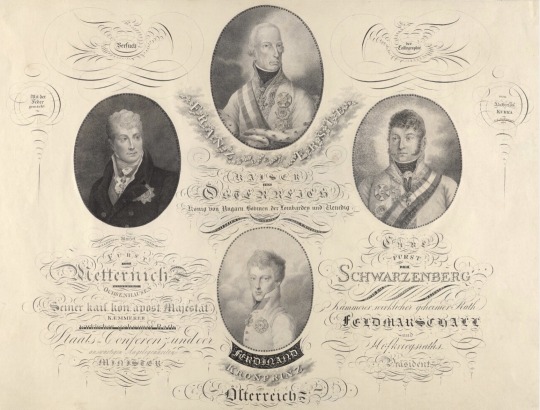
As you can see, it’s a miraculous lithograph “made with a feather” ( mit der Feder gemacht ) in 1816 by Adalbert Joseph Kurka.
(Actually, there is a small touch of Photoshop magic: Schwarzenberg was looking the opposite direction in the original picture and I thought it was much more fitting for him to exchange glances with Metternich as they went through all of the troubles successfully! What a relief it was for them, I bet…)
In my opinion, it’s pretty much safe to say that this piece of art probably symbolises the final triumph over Napoleonic France, considering it’s production date. While the Imperial court was minding the state affairs in the Northern Italy which had returned to Habsburg’s monarchy once again, some skilled craftsman depicted the current “balance of power” in the Empire in an artistic form.
So we have a ruling emperor with his beloved eldest son who was only twenty-three years old at the moment… 👑
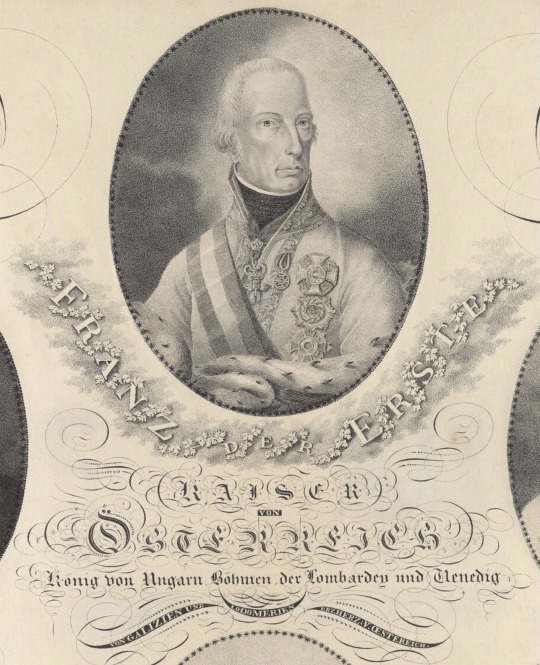
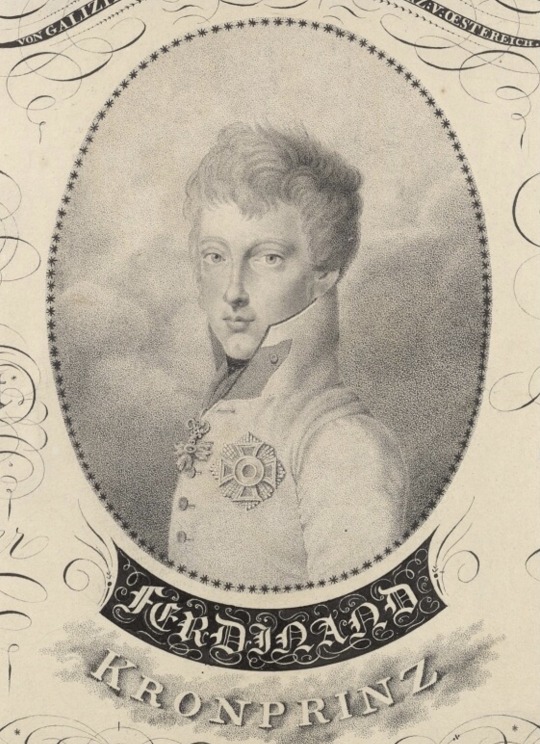
…And two loyal servants of the imperial crown - a statesman and a military man - whose continuous common efforts finally led to the much-needed years of stability and peace (at least in theory)! 🎉
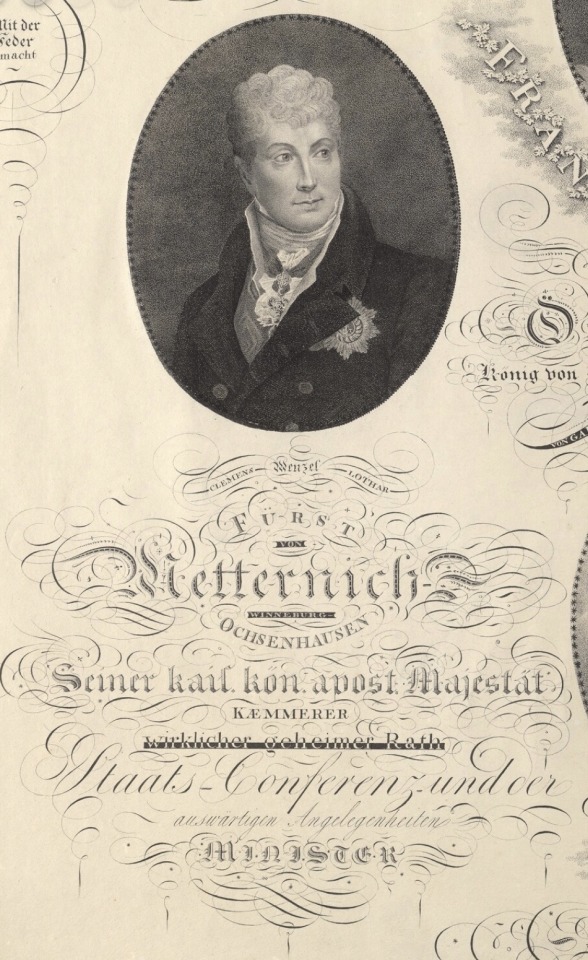
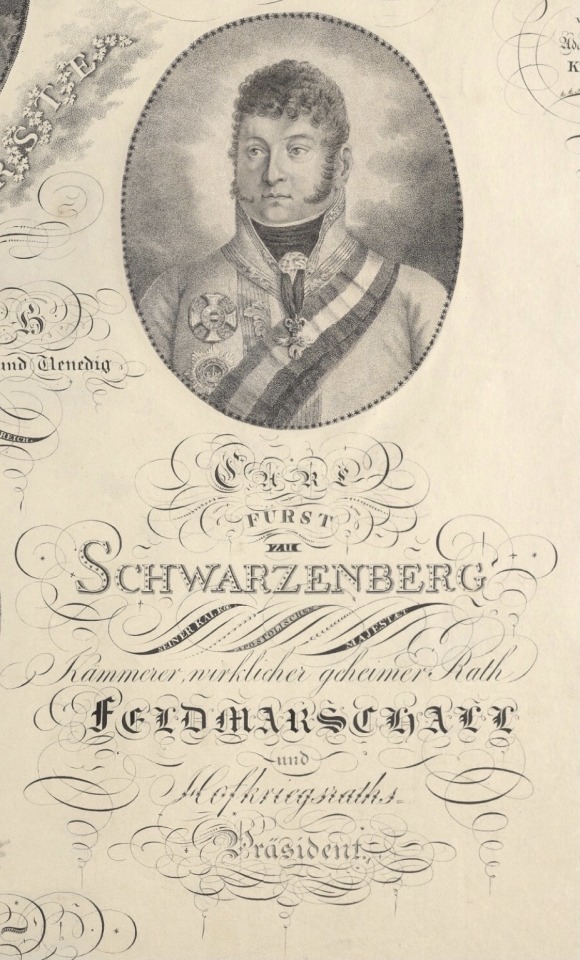
Picturesque calligraphic inscriptions under their portraits read that
Clemens Wenzel Lothar Prince von Metternich-Winneburg-Ochsenhausen [is] His Imperial and Royal Apostolic Majesty’s Chamberlain, Privy Councillor, State Chancellor and Minister of Foreign Affairs
and that
Carl Prince zu Schwarzenberg [is] His Imperial and Royal Apostolic Majesty’s Chamberlain, Privy Councillor, Field-marshal and President of Hofkriegsrath [Court Military Council]
Magnificent sight, isn’t it? :)
Soon I will make a post about how exactly my personal acquaintance with Herr Schwarzenberg had started (that was originally the reason for why it all escalated so quickly a year and a half later).
Stay tuned! 🪄
#history#napoleonic era#napoleonic wars#franz ii of austria#ferdinand i#klemens von metternich#karl zu schwarzenberg#austrian empire#austrian history#19th century
36 notes
·
View notes
Note
hi! do you have any thoughts on free marches culture/fashion/inspirations etc? im trying to piece together some marcher names but i cant find any real world inspirations to draw from - my best guess rn is a blend of like, irish, english and greek with some slavic inspo from ferelden?
Hi!
It’s a very good ask, thank you!
The Free Marches are great for headcanons because we know so little about them. We know about Kirkwall but other than that? The possibilities are endless.
The Marchers are canonically descendants of both the Alamarri and the Tevinter people so I would expect some level of multi-ethnicity in all the city states. I also think that cities closer to Tevinter and Antiva (like Hasmal or Ansburg) would have more in common with those countries while cities like Kirkwall or Ostwick would resemble Ferelden more.
I've also checked the official titles in various cities because they might show the connections to other countries. Based on that the fact that the ruler of Ostwick bears the title of Teyrn may suggest that, at least at some point in history, Ostwick's political system was under strong influence of Fereldan culture. Similarly, the title of Duke in Wycome may suggest strong Orlesian influence.
These differences would affect accents, cuisine, perhaps some local holidays as well. As for fashion, I think that the differences between nobles in each city state would be far from striking as the court fashion has a tendency to be more unified across cities and even countries. The clothes and the hairstyles of the lower classes would be much more varied, though, and if you are looking for inspiration, it would be good to look through regional folk costumes across different countries.
As for real-life inspirations - I personally headcanon The Free Marches to represent Central Europe (more-or-less the borders of the Holy Roman Empire), the Balkans and Greece. I also like to add England to the mix because in my headcanon Ferelden is closer to Slavic than Anglo-Saxon culture. I especially headcanon Ostwick and Tantervale to have a bit of 19th century England vibe when it comes to their culture and aesthetics. More toned down in fashion compared to rococo-styled Orlais, with strict manners, where self-restraint and piousness are really valued. People from Ostwick would frown both on Orlesian hedonism and Fereldan straight-forwardness. But it’s just my personal take, made to serve my (sad) Trevelyan’s backstory. 🙂
I don't have well-defined ideas for other city states at the moment but I'm curious to hear other people's thoughts!
I know that it’s not much information but I hope that it helps you a bit 🙂 Have fun creating your own version of The Free Marches!
For good meta about The Free Marches I highly recommend:
* the map of The Free Marches with additional non-canon places added by @grogblogging
https://grogblogging.tumblr.com/post/155309281375/non-canon-map-of-the-free-marches-the-official-map
* Dragon Age Names Catalogue (for canon Marchers names) by @dalishious
https://dalishious.tumblr.com/post/653090877420503041/dragon-age-names-catalogue
14 notes
·
View notes
Note
Some additional points about that grave find in Finland that you may or may not find interesting. And that may or may not be dated, because I studied history 20 years ago. That said, I'm not sure if 1000 years ago is firmly middle-ages in this context? At least back in my uni days, they told us that here middle ages got going slowly during 1100's and 1200's when Sweden started converting the population to Christianity and the prehistorical era gradually ended. Maybe they teach differently now.
More about the grave. I don't know why The Guardian would talk about Vikings in this context at all, because the erstwhile population of current day Finland is not considered to have been Vikings, afaik. They were similarly warlike, and the graves from that era have a lot of weapons, and they certainly encountered Vikings, but they never participated in the raiding, and isn't that what makes Vikings Vikings? Their language and religion was also different. But anyway. I don't mean to correct you because the larger point stands. When I saw the headline in a Finnish news paper about that grave and traditional gender roles my first thought was, well, maybe the gender roles hadn't become traditional then yet. Just some additional context, which could be illuminating or could be totally dated.
I did the stupid thing and sent you asks about the Suontaka burial before reading the Cambridge article about it: I'm reading it now, and my comments seem fairly useless. Feel free to ignore with extreme prejudice. We're in agreement on the guardian article.
Aha, well, we all make mistakes from time to time, so no worries! However, since you do touch on a few points that I would like to discuss, I'm going to go ahead and answer, whether for you or anyone else who might find it useful. (It's the teacher in me, I'm afraid.)
First, I have to say that I had a definite "eeegh" moment at the idea that the eleventh/twelfth century isn't "medieval" in Finland just because it (at least prior to the Baltic/Northern crusades, if we're considering them to begin with the Wendish Crusade in 1147) wasn't yet fully Christianized. Scholars pretty universally accept "medieval history" as referring to the time period between 500--1500 CE (the fall of the Western Roman Empire to the Renaissance). These, of course, are horribly Eurocentric frames of reference, but there you have it. Any event or culture taking place within that span of dates, no matter where in the world it is or what its socio-political circumstances may be, is medieval. We have to call out the pernicious equivalence of "medieval" with "Western Christian European," since that seems to be the underlying assumption. This is also what makes people mistakenly think that the medieval world (which, y'know, was just as big as it is now) is exclusively about white Christian Europe, and that no other global regions have a medieval history. Either way, the eleventh/twelfth century is actually closer to the end of the medieval era than it is to the start. I'm certainly not suggesting that you were consciously implying this; I have no trouble believing that that is indeed how they taught it twenty years ago. But yeah, the idea that still-largely-pagan eleventh-century Finland couldn't be "medieval" until it's Christian is definitely not the case as understood now.
The idea that anywhere in eleventh-century Europe is still "prehistorical" in any sense of the word is likewise a little baffling, tbh. Once more, it associates "history" only with "Christianity," and that would get quite a bit of pushback if included in a paper on medieval studies today. That is what also annoys me deeply when I see people describing the pre-Columbian Americas as "prehistoric" (read: pre-white-people-historic). If the chief marker of "history" is "written history," sure, there is a very narrow pedagogical argument to be made that these societies don't have narratives or chronicles in the standard historiographical sense. But also, uh, European colonialism and conquest destroyed vast swathes of records that we have never been able to read, understand, or even access, because they're just not there anymore. There is ample evidence that the ancient (and I do mean ANCIENT, up to thousands of years BCE) and early-to-late-medieval Mesoamerican societies had complex systems of writing, astronomy, calendar-keeping, and other history-recording practices, right up until 1492. There are something like four (FOUR) pre-Columbian Mayan scrolls still in existence, out of probably thousands and thousands, because the Spanish destroyed the rest. So "prehistoric," unless you're literally referring to the Stone Age, is never a politically neutral word or a word to use uncritically...
...and speaking of the Stone Age, we actually have histories for that too! Or rather (iirc) the Ice Age, because for example, Aboriginal Australians transmit their history orally and require each new generation to memorize it, word for word, exactly as taught to them. Some of these histories stretch back over ten thousand years, which means that we actually have first-person accounts of life during the end of the Ice Age, and scientists recently discovered that these traditional narratives accurately reflected the archaeological and geological record of Australia during the time period in question. (Indigenous people know what they're talking about and should be listened to, example number 85,000.) Of course, the Western-white-supremacist model of historiography calls these just "legends" or "myths" or "folktales" rather than history, because I guess not writing it down in a chronicle as a monk in a European Christian monastery in the year 1015 or whatever doesn't qualify as history for some people. (I don't have strong opinions about this or anything. Welp.)
I likewise don't know why the Guardian article brought up the Vikings, aside from the fact that they were quoting someone who explicitly used the Vikings in a hypothetical scenario about "traditional gender roles." This person expressed surprise that an intersex person living in a medieval Scandinavian society could rise to a high social role, by citing the widespread belief that "Vikings" were all dedicated to being very manly at all times and nobody with feminine qualities/feminine-coded social power could rule over them. I don't know if this was just a bad phrasing (plus, it obviously overlooks the often-egalitarian nature of medieval Scandinavian societies and plays into the favored white supremacist stereotype of the Vikings as some Master Aryan Race Where Men Were Men, etc) or what, but yeah, it's wrong across the board. Viking is the name of an occupation, not an ethnicity. It comes from the word wicing, meaning "seafarer" or "sea raider," and referred only to those guys who went out on their longships and stole a lot of stuff from their neighbors, most notably in the eighth to eleventh centuries. Their families back at home were part of the exact same society and benefited from those raids, but strictly speaking, they weren't vikings. We use the word "Viking" to describe any member of a medieval Scandinavian society, but it's similar to describing everyone living in the eighteenth-century Caribbean, no matter who they were or their social status or ethnic background, as "pirates," which is obviously inaccurate.
As you correctly point out, the Finns aren't considered quite the same as the Norwegians, Danes, and Swedes (as anyone can tell from looking at their written language; N/D/S are mutually intelligible and derive from the same linguistic family, while Finnish is COMPLETELY different and comes from an altogether separate branch of the tree) and therefore it's even more baffling that the person quoted in the Guardian article would cite them as an example of a "Viking" society. Likewise as you note, the whole phrase "traditional gender roles" is intensely problematic in most contexts, and especially here. It assumes that modern Western ideals of sex and gender have been static and unchanging throughout history, and that means that we tend to read our own (biased) assumptions onto the historical record and then get surprised when, shock of shock, they don't fit. The burial at Suontaka seems to have been of a biologically intersex person (i.e. someone with Klinefelter syndrome), but this is also the case when it comes to people assigned the usual male or female at birth, without any complicating genetic conditions. I'm working on a book review for an entire edited volume that discusses the intense gender-fluidity and proto-transgenderism in some medieval saints' lives, and how obviously the fact that they have been held up as a holy example, while explicitly subverting the so-called Traditional Gender Roles of the Middle Ages, means that it was (and is) a lot more complicated than shallow stereotypes and Bad Medievalism would have it.
Anyway, this is long enough (especially considering that you graciously offered me the chance to ignore it) so I think we'll stop here for now. But yes, there you have it. :)
22 notes
·
View notes
Text
I got a reply to my post about Nicky and Joe from The Old Guard from @vacartu about the development of the Italian language, and I thought I’d share a little about this because it’s so interesting and I think it could be useful if people start writing fanfics about the characters set in the past. Keep in mind that this is a very short version of a very complex concept.
As @vacartu guessed, from the fall of the Roman Empire to the 13th-some would say 14th century, what we now call “Italian language” did not really exist, people in Italy mainly spoke a bunch of variations of vulgar Latin, while proper Latin was still used in literature, politics and in the Church. Of course it’s also important to point out that Italy did not even exist as a united country back then, the peninsula was divided into small kingdoms and city-states and so on.
Around the middle of the 13th century, Frederick II, emperor of the Holy Roman Empire, acquired the crown of the kingdom of Sicily and, being the enlightened sweet boy that he was, he promoted literature in the vulgar language of the kingdom. That vulgar language was so elevated by the incredible poetry of his court that it became well known in the whole peninsula. When Frederick died, a bunch of poets from his court moved to Florence and their influece was so great that when Dante and his friends, in the 14th century, decided to shake things up in Florentine poetry and founded the “Dolce Stil Novo” (literally “sweet new style”), they took their dialect, which had already planted some roots in Florence, and elevated it as a “noble” language that would later develop in what we now call Italian.
Of course Italy only became united in the late 19th century. At the time many writers who supported a united kingdom of Italy felt the need to look for a dialect that could represent the Italian people, who still mostly spoke regional dialects. Among them, novelist Alessandro Manzoni chose Dante’s Florentine dialect to write his novel I Promessi Sposi, the first modern novel written in Italy, and his writings proved so successful that the Florentine dialect was largely accepted as the “official” Italian language.
Sooo going back to Nicky and Joe... they were around for the first crusade, which was in 1096-1099. It’s safe to say that Nicky would speak Genoese dialect. Since they were probably together in the 13th and 14th century and given Joe’s affinity for poetry, it’s nice to think that they would learn the new dialects together and probably read the super-romantic sonnets by the early poets of Sicily and by the Florentine poets. The verb I was speaking about, “destati”, is very 19th century. Living kind of a secluded life, they probably still speak an old-fashioned version of the language when they’re alone. I think it’s adorable and that line is absolutely perfect.
413 notes
·
View notes
Text
Following an advice given by my friend @flamaflavio I've decided to dedicate a series of posts on Northern Italy(because there's a serious lack of them in the fandom:(),whether they might be about culture,history,folklore,stereotypes(could be an interesting addition to characterization)or misconceptions*? Maybe even cuisine ahah
In this post I'll expain what we intend for North Italy, why it doesn't line up perfectly with canon and most importantly why Feli gets called "Italy" way more often than Mano.
Let's start by stating that in our country by North Italy we mean the regions of: Aosta Valley (Valle d'Aosta), Emilia-Romagna, Friuli-Venezia Giulia, Liguria(the region your girl's from), Lombardy(Lombardia), Piedmont (Piemonte), Veneto and Trentino Alto-Adige.

So you might ask me, why is it that in Hetalia Chibitalia has been shown as Florence as well??? Is it a mistake made by Hima?? Yes.. But actually no ahah! In this post I'll cover how we came to such a perception of the North in our country and why Tuscany and the rest of Central Italy, isn't included in it and doesn't consider themselves part of it :D
I won't talk about all history until nowadays of course (I'll definitely make future historical posts) I'll simply give you basic information based on early history to have an understanding of how us italians divide our country and why in canon other nations refer to Feliciano as Italy more commonly than they do with Romano(it is indeed based in history, it's not mean spirited!!).
So during the centuries prior to romanization North Italy was inhabited by a different bunch of cultures, among them the long haired Ligures(whose origin is unsure,Celtic?? Or simply celtified by their neighbors uhmm?? Talking about them in detail would take a whole ass post) the Veneti who were known for their commerce of amber and horse breeding, the Etruscans who, coming from Tuscany, colonised parts of the North and founded cities such as Bologna and in a later period a swarm of Gaulish tribes(generally referred to as the Celts).
The latter(most likely the Insubres) founded Milan in 590 BC, naming it Medhelan(the place in the middle of the plain, or among rivers) or Mediolanum as the Roman would call it later(Meśiolano as a Celtic engraving informs us) keep Milan in mind we'll come back to her later. Their domain extended from the Alps to the Adriatic sea.
This would be stopped by roman conquest that would culminate in 194 BC in the foundation of a province under the name of Gallia Cisalpina**,Cisalpine Gaul, id est Gaul on the hither side of the Alps(from the Romans point of view) that pretty much contained the regions which nowadays we consider North Italy.
The area became one of the most influential and rich provinces in the empire and it's strategic role is emphasized by the fact that in 286 the capital of the Western Roman Empire is moved from Rome to,guess where, Milan the main city in Gallia Cisalpina(and later on in Ravenna from 402 to the fall).
Is this why Grandpa is shown to leave poor Romano behind in canon in favour of his little brother??? Most likely!!! Btw if you're interested in the subject you should totally check out jjblue's Italia Annonaria (baby Feli) and Italia Suburbicaria (baby Mano) profiles on DA.
It's really unfair that the other characters call only Feliciano Italy:/ It's actually not true, as my friend flama has talked about in one her posts both Germany and America have called him Italy in the past. The fact that this behavior hurts Romano is long lasting misunderstanding in the fandom: he really doesn't care.
What annoys him it's that he's often referred to as "Italy's older brother" but not because he's Italy as well, but because that takes away his individuality: he's peeved by the fact he's only considered in relation to his brother, he's Romano besides being Feliciano's older brother ahah.
If his identity as Italy truly mattered to him he would have some kind of reaction out of being called Italy, especially by someone he has a bad relationship with like Germany, but he was left completely indifferent by that. I've often seen fanfictions where he's moved to tears by such action by it actually seems like he doesn't mind. He just wants people to understand he has a persona outside being Feli's big brother ahah.
There's actually a reason why Feli is "Italy" and it has been actually brought up recently in the fandom. Let's go back to history ahah.
A germanic general named Odoacer overthrew the last Roman Emperor, whose name for some reason I always found funnee, Romulus Augustulus.
Now the Eastern Roman Empire was having none of that and decided to invite Theodoric the Great of the Ostrogoths to rule over Italy under their approval(btw if you'll ever visit Ravenna do check out Sant'Apollinare Nuovo and Theodoric's Mausoleum). Ostrogothic rule was short lived (lasted pretty much Theodoric's reign) but greatly improved the economy and the arts. . . Too good to be true of course, because Justinian I(Eastern Roman emperor)decided he wanted to revive the glory ™ of the empire and this brings us to Gothic Wars.
Italy, especially the North, was left devastated by them, as they brought death(duh),poverty and were accompanied by a good dose of famine and plague. Byzantine rule wouldn't last long as a Germanic tribe***, the Lombards, took advantage of their weakness and took over italy and gave birth to a reign, which had Pavia as capital.
Said reign was called Langobardia, in particular North and Central Italy were named Langobardia Maior(The great Langobardia), which is the name under which North italy would be known as for a good part of the middle age and that gives the name to the modern region Milan and Pavia are located, Lombardia/Lombardy.
For example Boccaccio in his Decameron(in particular in the first novella) uses Lombards when referring to Italian merchants because that's the name they were given even if most of them came from Piedmont and Tuscany.
Lombard language and culture slowly was assimilated into the previous one and that can be seen in names, words and laws created in that period. This came to an end in 774 when Charles the Great, king of the Franks(and future Holy Roman Emperor), conquered Pavia and annexed the Lombard kingdom... Under the name of Kingdom of Italy!
So in other words the reason why our boy is the one who's called Italy the most is because he's simply been "Italy" for longer or more specifically for more than once(as I explain in the notes:)!!). Mano on the other hand would have most likely known as Kingdom of Sicily, Kingdom of Naples or Kingdom of the two Sicilies :). And I'm very much sure he would have been proud of such identity.
But what about central Italy??? You see the Papal States forged a document the Donation of Constantine, according to which Emperor Constantine assured Pope Silvester I(in 321) and his successors the exclusive domain over the city of Rome(btw Rome isn't part of southern Italy!!the fact South Italy is called Romano is really weird and so is North Italy as Veneziano ngl). This gave the Church access to "temporal power",id est material power and with it came territorial power. And so little by little (with the exception of Tuscany that flourished on it's own) it ate up the whole of Central Italy, which would develop a linguistic group, a culture and history of its own.
And that's pretty much what you need to know to understand Hetalia's confusing lore ahah. It's not everything I could go on explaining the era of the Commons and the Renaissance and go all through medieval and modern history to make you fully grasp it but I think it's enough for today:D let me know if you want me to talk about the subjects I mentioned in detail and if you want me to go on. Read the notes :)!!!
*I've often seen Feli wearing tarantella clothes, because it's probably assumed as the italian™ traditional dance and the music is misused in videos about Italy(all of Italy!!)when it's really characteristic of the South:)! Would be nice to see more fan arts of Mano in those garments lol really nice
**Napoleon would found in the 18th century the Cisalpine Republic in North Italy, a sister republic of France, that would later become known as the Italian Republic and then the (napoleonic!!!)Kingdom of Italy:) not to be confused with the Kingdom of Italy that would be born on the 17th of March 1861,ring a bell ahah???Read Hetalia's Risorgimento strips if you want to know about that:)))Milan djdbdb was once again the capital of all these.
***considering Romano is stated to have Arabic blood which is definitely brought by the moorish occupation, I'd assume Feli's Germanic one has to do with daddy Lombards. The longobards ruled over the South as well so ehhh, but hey it's Hima we're talking about. Genetics work in a weird way in hetalia, they're like acquired??? Hima explains that Canada, America and Seychelles don't have England's bushy eyebrows because of France's influence. Wtf. Oh btw if you might be interested in the Lombards' origin in Historia Langobardorum Paulus Diaconus informs us they came from Scania(a region in Sweden) and the settled in "Scoringa".
#I've been feeling down lately and needed a distraction#hope y'all will like it#in any case i enjoyed doing this :)#aph north italy#hws north italy#aph italy#hws italy#aph south italy#hws south italy
57 notes
·
View notes
Text
TAFAKKUR: Part 426
QUESTIONS FOR TODAY - PROPHETHOOD: Part 2
Is it possible that the One Who ordered this creation, opened to us His works, for our wonder and awe, Who desires to make Himself known through His creation, Who chose distinguished servants to guide our attention-is it possible that He would not, through these distinguished servants, reveal His names and Attributes to those who long to know Him? If this were so, would it not make His creation a vain work? The Supreme Being Who made everything like a tongue and a letter and Who revealed His Wisdom and Blessings through such things is absolutely free from vanity and absurdity. Thus, it seems to us, most unlikely that any people in one or other part of the world has been deprived of Allah’s revelation through His prophets. The Qur’an, indeed, is explicit on this point:
For We assuredly send amongst every people an Apostle (with the command), ‘Serve Allah and eschew evil. ’(al-NahI, 16.36)
However, mankind forgot the teachings brought by those appointed servants and over time went astray, sometimes deifying the very men who preached against it, and sank into idolatry.
Throughout the earth there are examples of what man’s imagination has idolized-like the mountain of the gods in ancient Greece or, to this day, the River Ganges in India. Even accepting that there must be a tremendous difference between their first appearance and the actual position now, it is quite impossible to understand the conditions that raised Confucius in China and Brahman and Buddha in India. It is equally difficult to guess what they originally taught, or to know how far time and human degeneration have corrupted the first message.
If the Qur’an, which eradicates doubts, had not introduced Jesus Christ to us, it would not now be possible to have a true picture of his life and his teaching. For priests have confounded the truth about Jesus Christ with the philosophies and idolatries of the Ancient Greeks and Romans, attributing divinity to man, and anthropomorphizing God. The concept of the Trinity is certainly a priestly, human corruption-insulting as it is to common sense and reason and, still more shameful, impudent towards Allah.
Perhaps it was one of the conditions of the Roman Empire accepting Christianity as the official, state religion, that the festival, holy days, rites and rituals of the church are so obviously and shamelessly derived from, or imitate directly, the idolatrous practices of the ancient Romans and Greeks. For, without the enlightening revelation of the Qur’an, it is very difficult to tell the Jesus Christ worshipped in the Christian church from Adonis or Dionysus.
Considering that Christianity is relatively recent and considering what the Christians did to their prophet and to their Book, we may well wonder how many ‘Christs’ have been treated in the same way by their followers over time? From a reliable Islamic source, there is a hadith which says: ‘a prophet’s disciples will carry out his mission after his death but some of his followers will also upset everything he established’ (Muslim, Fada’il al-Sahaba, 210-12; lbn Hanbal Musnad, 417) This is a most important point. Many of the religions which we now consider false turned to falsehoods, superstitions and legends over time through the deliberate malice of their enemies-despite the fact that, originally, they may have come from the purest, Divine source.
To say that someone is a prophet when he is not is tantamount to kufr (unbelief), just as to refuse to believe in a true prophet is also kufr. On the other hand, if the case of these false religions is similar to that of Christianity, that is, if they were distorted by their followers over time, we should look at those religions with some caution and reserve judgement in some measure. We should consider what Buddhism may have been in its true original; similarly, Brahmanism; or the doctrines attributed to Confucius; or shamanism and other such: it may be that we may find in them some remnant of what they were in their origins.
What they were-whether true or false (we do not know)-is not what they are. Supposing the impossible that their founders returned and saw the religion they originally established, they would not now recognize them.
There have been many religions which have been distorted and altered in the world, and consequently it is essential to accept the purity of their original foundation. The Our’an says:
There never was a people without a Warner having lived among them. (al-Fatir, 35.24)
And We assuredly sent among every people an Apostle. (al-NahI, 16.36)
These revelations universally declare that Allah sent Messengers to every people throughout the world. The names of some of these are known to us through the Qur’an, but there is also a large number whose names have not been made known to us. The names we know are 28 out of 124,000 (or perhaps 224,000); even then we do not know exactly where and when many of them lived.
Essentially we are not bound to know all the past prophets. The Qur’an says:
We did in times past send Apostles before you; of them there are some whose stories We have related to you, and some whose story We have not related to you. (al-Ghafir, 40.78)
In this way, the Qur’an warns us not to deal with some of those whom it does not mention to us.
Recent studies in comparative religion, philosophy and anthropology, have shown how many communities, living at very great distances from each other, share certain concepts and practices. For example, turning from plural to a singular conception of God; in their supplications in times of exceptional stress seeking refuge only in the One Supreme Being and raising their hands and asking something from Him. There are very many such phenomena which indicate a singular source, a single teaching.
If primitive tribes cut off from civilization and the influence of the known prophets, have a sure understanding of the Oneness of Allah, though they may have little understanding of how to live according to that belief, it must be that, as the Qur’an tells us, every people and nation has had its own Message and Messenger:
To every people was sent an Apostle. When their Apostle comes (before them), the matter will be judged between them with justice, and they will not be wronged. (Yunus, 10.47)
No people and no land are excluded from that commandment.
This brings us to the question of whether those who claim they have not been sent a prophet will be held responsible for their beliefs and actions. As we have just explained, there is no reason to believe that any peoples in the world have been deprived altogether of the prophets’ light. There may have been periods in which darkness seemed to prevail. But such were temporary darknesses, after which the Grace and Blessing of Allah again enlightened the people through revelation to His chosen servants. Thus, whether it be less or more, every people, at some point in their history, saw or heard or experienced to the full, the mercy of revelation. Nevertheless, we must allow that, in some instances, the destruction of the beliefs which the prophets established was so absolute, and people introduced so many distortions into the religion and bizarre rites of worship, that the true teachings were generally, if not altogether, lost by the people. In such cases, a long interregnum of darkness may have replaced enlightenment. Though darkness is ever followed by an enlightenment, and an enlightenment by darkness, there may be some peoples who remained in darkness as it were unknowingly and against their own will. For such people there are glad tidings in the Qur’an. These are not punished or blamed for the wrong they may do, until and unless due warning has been conveyed to them: We would never visit our wrath on any community until We had sent an Apostle to give warning (al-Isra’, 17.15). That is, the warning precedes responsibility and then reward or punishment.
As for the details of this matter, the imams of the Islamic schools of thought think differently. For instance, Imam Maturidi and his school argue that no people can be excused given that there is plenty of evidence pointing to the One Creator which leads to belief in Him. By contrast, the Ashari school, referring to the Qur’anic verse quoted above, argue that warning and guidance must precede judgement and people can only be held responsible if they have been sent a prophet. There is a third body of scholars who have combined these two positions. They hold that those who have not been sent any prophet and thus have not wilfully strayed into unbelief or worshipped idols are ahl-i najat (the people who will be excused and so escape the punishment and who, as Allah wills, may be saved). For, in fact, some people cannot analyze the things and events around them, cannot penetrate to their meaning, nor deduce therefrom the right course of belief and action. Such people are first taught the right way, given explanations and directions on how to act and then, in line with their actions thereafter, are answerable and accordingly rewarded or punished. But as for those who wilfully take to unbelief or adopt a hostile, negative attitude to belief and religion, or knowingly defy Allah and His commandments, they will certainly be questioned and punished for their deviation and corruption, even though they live in the farthest, most desolate and deserted region of the world.
To summarize: no region or people has been altogether deprived of Divine enlightenment through Allah’s chosen servants, His prophets. Directly or indirectly, all people of all periods have, at some time in their history, known or been aware of a prophet and of his teaching. A period during which the names of the prophets have been forgotten and their teachings completely eroded, until another prophet is sent, is described as an interregnum. It is accepted that people who live in those periods would not be punished but rather excused, on the condition that they have not knowingly and wilfully deviated into polytheism or atheism.
And Allah, the All-Knowing and All-Encompassing, knows best.
#allah#god#prophet#Muhammad#quran#ayah#sunnah#hadith#islam#muslim#muslimah#hijab#revert#convert#dua#salah#pray#prayer#welcome to islam#how to convert to islam#new muslim#new revert#new convert#revert help#convert help#islam help#muslim help#reminder#religion#convert to islam
5 notes
·
View notes
Text
An Autumn Walk
This is for @hetalia-writers-monthly
The prompt is Quote: “The trees are about to show us how lovely it is to let the dead things go” - Anonymous
Characters: Germany and Prussia, mentions of Holy Rome
Relationships: Fraternal Germany and Prussia, GerIta
Word Count: 2,000
Autumn had set upon Berlin in earnest, and it was turning the trees of the Tiergarten golden and red. There was a chill in the air, but it was pleasant.
After living here for so long, Prussia was of the opinion that climate of the city was the best at this time of year. The bite of winter was still distant, and the sweltering heat of the summer was gone.
He also loved the way that the autumn leaves colored the city, painting the streets orange and red. It was a last moment of bright color before the city would lapse into the greys of winter.
He was taking a moment to enjoy the turning of the season with his brother. They were taking a walk through the Tiergarten as a rare break from the demands of building an empire. Germany had asked for some time together, and a stroll through the Tiergarten was the most convenient way to have casual privacy.
Prussia had less on his shoulders now that his brother was in charge of the country, so he was glad to take a walk and offer whatever advice Germany wanted. He still had his own responsibilities as the largest state and as the one who had the closest relationship with the dynasty.
He had given Germany his kings, but he still knew the Hohenzollerns best. He was still the best intermediary between Germany and the monarch. As for the chancellor, it was evident to Prussia that Bismarck was still Prussian to his core. So, there was still an important place for Prussia in Berlin.
As a brother, he had the sense that Germany had asked him to go on this walk with something on his mind. It was easy to tell when he had something turning behind his eyes.
He expected the conversation to start at any moment, because he knew that Germany could never keep his thoughts to himself for very long. If he had something on his mind, then it would come out.
Prussia was just waiting for him to say something. As they walked deeper into the park, far enough that the victory column was no longer visible at the periphery of Prussia’s vision, Germany finally started talking.
He started, “I have been talking to Feliciano.”
That was no surprise; Germany seemed like he was becoming fond of Italy. Ever since the war against Austria, Prussia had noticed the way that they had been spending more and more time together. They seemed to think that it was clandestine or subtle, despite rarely finding a truly private place to talk.
Anyone could have easily seen the magnetism between them. If he had wanted to, Prussia could have easily eavesdropped. But he had chosen to allow the young love to take its course. He was happy for them, albeit slightly concerned with how quickly Germany had seemed to attach to the Italian.
Prussia added in his own mind: Oh yes, I’ve noticed that you’ve taken an interest in him. Anyone could see that.
He did not voice it though, because he had some restraint. He could almost feel Fritz’s hand on his shoulder, reminding him that the realization was not an easy one, and it would take time. Realizing feelings for another man could be difficult, especially for a young man who was still learning about himself.
If Fritz was here, he would remind him how long it had taken him to realize he had an attraction to men.
There was no use in pointing it out to Germany or teasing him. It would only make him more self conscious if he did not realize on his own yet.
So, after a long moment of contemplation, he said, “And what have you been talking about?”
He could guess, since he had once been a young man who stole moments with someone else. But he was certain that Germany would not share all of that with him, since he was his brother. Lover’s moments were meant to be private.
He watched the blonde’s face as he waited for an answer. There was a suggestion of an anxious blush. Germany finally answered, “Oh, many things. My life, his life, the future.”
He sounded anxious, and he was always short when he got anxious. But Prussia thought it still sounded very much like a conversation that lovers might have. Germany gathered himself and started talking again, “I think I like him more than I expected I would. He's not strong or bold, but I still like him.”
There was a furious pink blush in his cheeks now, and Prussia felt for a moment like he understood what this conversation might be. He could already imagine what might be coming next.
Was his brother about to tell him that he had feelings for Italy?
He immediately tried to think of a way to respond so that Germany would feel comfortable talking to him. He had to make sure that his brother did not feel any shame about his feelings.
But, Germany quickly added, “I mean that he is a very good friend.”
Prussia sighed to himself. His brother had not yet come to that realization, or decided to share it with him. He discarded his own prepared speech and looked up at the trees while he was waiting for Germany to get t whatever was on his mind.
He did say, “You know I encourage your diplomatic endeavors, but why are you telling me this?”
There was dappled light filtering in through the trees and it made the whole day feeling charmingly cozy. There was a moment of quiet, which was only punctuated by the crunch of leaves under their feet.
Then, Germany seemed to summon his strength and say, “He was telling me about the Holy Roman Empire. They lived together when Austria ruled him.”
Prussia hid his own surprise, because it had never crossed his mind that Italy had known his younger brother. He hadn’t considered that they lived together before.
It made sense looking back. At the time, Prussia had little to do with the politics of the rest of Europe, and it had escaped his notice.
In all the times that he had watched Germany talking intently to Italy, he had not thought that they may be rekindling a connection. Even if Germany did not remember it, it was entirely possible that he still felt a glimmer of friendship.
Could Italy tell that the man he was talking to was the same one that he had known years ago?
The thought was strangely haunting to Prussia, almost melancholy. How odd it would be to talk to a ghost.
Germany continued to speak, “The way Feli speaks about him makes it sounds like he really misses him. I think they were very good friends.”
Prussia thought, momentarily, that it was amusing that he used the same term as his own romantic feelings. He really must not have any idea what was developing between them.
Then, an old conversation surfaced in his mind. Holy Rome had once told him that he intended to get married to one of Rome’s heirs. It had been a topic Prussia had quickly dismissed once he had severed his relationship with the Catholic empire.
The comment brought it back to mind so clearly, and made a sudden strange sense. Had he meant to marry Italy before his death?
The thought was even more melancholy, because Prussia could easily imagine the grief that Italy had felt when Holy Rome had vanished. He knew the pain of losing a lover.
He glanced at Germany, and could see the likeness of young Holy Rome in his face. He was older now, but he did not look so different. Given the right cloak and hat, it would be easy to see.
How strange and painful that must be for Italy. Did he know that he was talking to half a ghost?
Did he gravitate towards Germany because he could see the resemblance so clearly?
He could not imagine how he would have reacted to a man who looked like his lost love, but who had none of their memories together. Italy must be more conflicted than he was showing.
He wondered if Germany’s own fondness for Italy came from that childhood relationship. The heart may remember what the mind had forgotten.
Germany seemed to be struggling through his thoughts as he said, “When Feli talks about him, I feel almost like almost I knew him.”
He trailed off for a moment, and the methodical crunch of leaves beneath their feet filled the silence.
Prussia thought for a fleeting moment that Germany was about to break through an amnesic barrier. The thought was terrible, because it would bring a cascade of pain and betrayal.
Whatever the feeling of death had been, the pain had been enough for Germany to lock it away in his own mind. There was an experience there that Prussia could not imagine, one that had been terrible enough to forget everything that came before it.
If Germany broke through he would remember that Austria had left him to die on a battlefield, and Prussia feared what the repercussions would be for his psyche. The amnesia was surely a way to protect himself from the knowledge that he was left to die.
Selfishly, he knew that he would also be called to account. If Germany remembered that he was once the Holy Roman Empire, then he would ask why Prussia had never told him. And that was not a conversation Prussia was prepared to have.
He watched with trepidation, wondering if Germany was about to experience the full force of those emotions.
But then Germany shook his head like it was an absurd thought, and Prussia breathed a short sigh of relief.
To reinforce that conclusion, Prussia said, “You did not know him. He died a long time ago.”
He knew it was half a lie, but it was one that would keep Germany from interrogating his own memories.
Germany shook his head one more time and said, “I know that. But, I wanted to ask you if you remembered him. He was our brother, wasn't he?”
He looked like he was trying to put the pieces together in his head. Prussia answered the question, “We had the same father, but I never knew him well. Roderich would know him better than I did. My king was never the Holy Roman emperor, and Holy Rome never lived with me.”
He hoped that would be enough to put the topic to rest and avoid any danger of old memories resurfacing. Germany was chewing the inside of his lower lip, like he was thinking very hard.
Prussia knew that there was more that he could say about the Holy Roman empire, but it would be inappropriate. He had thought Holy Rome was weak and ineffective, and he had spent years training Germany to overcome those qualifies.But, it would be unkind to tell a man about the weak boy he had once been.
Germany pressed him, “Can you tell me what you remember about him?”
Prussia sighed. He had to come up with an answer, and it would have to be one that would satisfy Germany’s curiosity.
He stopped walking, and looked up at Germany solemnly. Hemet the curious blue eyes and said, “Listen to me. Maximilian had too much power for a boy his age, and it killed him.”
He stepped towards his brother and placed his hands on his shoulders. He wanted Germany to listen to every word clearly. He enunciated every word as he said, “That is exactly why I made sure you were ready to become an empire. I was not going to let you fail the way he did. You are the future and I wanted you to be ready. I have lost one brother already, and I will do everything in my power not to lose you.”
The words he dared not say echoed in his mind: I will not be able to bring you back from death a second time.
He omitted the fact that he had spent time planning to fix the deficiencies that had brought Germany so close to destruction before.
He continued, “Now take an example from the season. Let the dead go, and move forward.”
The blonde nodded and replied, “But what about Feli? I want to understand him.”
Prussia drew in one more breath through his nose. He could hear the pangs of love in his brother’s voice, the first love that he neither fully forget nor fully remember.
Prussia answered, “Show him the man that you are, and he’ll love you for it.”
34 notes
·
View notes
Note
There was a war back in the Middle Ages. The Crusades. This war was fought to control the Holy Sites. Catholics were behind this fight to prevent the spread of Protestantism. The Catholic Church has been behind so many brutal atrocities in the name of "their God" including annihilating the indigenous people of Central and South America! What makes you think in that sense, that Christianity is better than Islam? Not all Christians are like that just the same as not all Islam is terrorism.
Uhm...some points:
I am well aware of the Crusades because guess who also have been victims of them.... the Greeks! We are taught extensively about them in school.
The first serious Sack of Constantinople (which was a Byzantine Greek city and the spiritual stronghold of Orthodox Christianity for the longest time before it became the predominantly Muslim Turkish Istanbul) took place in 1204 by the Crusaders, more than two centuries before the Fall of Constantinople to the Turks in 1453. There have been other serious attacks to the city by all sorts of people but it’s these two incidents (the Sack by the Crusaders in 1204 and the Fall to the Ottoman Turks in 1453) that irreversibly changed the Greek history, and in a bad way.
The Crusaders were notoriously cruel and didn’t give a shit whether Greeks were Christians too or not. As long as they were not Catholics they were slaughtered all the same. The Crusaders also looted and pillaged the Byzantine Empire beyond belief - which is why you’ll find countless of Byzantine imperial treasures in Western Europe and few in Greece itself).
For the longest time, Latin Catholics and Byzantine / Greek Orthodox hated the guts of each other. This is one reason the Pope didn’t answer the Byzantine call for aid when Turks attacked it except under the condition that the Orthodox would pass under the See of Rome. And, basically, the Greeks then were like “heck we rather die than succumb to the Catholic’s whims”. Another example of the hate is the alleged incident of the Crusaders making a prostitute sit on the throne of the Orthodox Patriarch during the Sack of Constantinople.
After the Crusades, the Byzantine Empire was never the same again even though it still existed in name. Actually, many of its regions had become Latin States ruled by Venetians, Genoese and Franks. After that, the Byzantine Empire consisted of only few cores - lands that were severely weakened and with a huge decrease in population. It is widely believed that if the Byzantine Empire wasn’t so wrecked by the Crusaders and Latins in general it would have managed to defend itself from the Ottoman Turks which would mean an entire different course in history for the Greeks.
I have spoken before of all this and much more in this post: Greek History 101 - Part II: Post-Ancient and Medieval History: Roman, Byzantine Greece and Latin states (146 BC - 1453 AD)
The fact that the Greeks suffered in the hands of Catholics doesn’t change the fact that Greeks suffered in the hands of Muslims too (and for longer). Greeks have suffered by pagans, Christians, Muslims and more. No discrimination here. And whenever we want, we’ll make posts about whichever of these we fancy.
Greeks aren’t Mother Teresas either, such a collectively angelic nation / ethnic group hardly exists: but let’s just say they have received more evil than they’ve done - especially later in time.
It’s not a matter of which is the best religion but rather that there are monsters under the pretense of following almost every religion. My response was in the context of someone questioning the sufferings of the Greeks specifically by Muslims (which is why my reply was specific as well) - a typical stance of some Turks and Muslims that aren’t very friendly towards Greeks and Christians or woke Americans who have no clue what happens in the rest of the world.
and
10. I literally never said Christianity is better than Islam. Like, nowhere. Just like I never said Islam is terrorism. These are your imaginings.
#greece#history#world history#byzantine history#greek history#crusades#sack of constantinople#francocracy#anon#ask#mail
24 notes
·
View notes
Text
For the first time in a long time I went to the movies in forever and then to Target. At Target I see some Godiva bars on discount yellow tags and I was ecstatic until I read 70% Cacao, Dark, Salted Caramel and was deflated.
Anyway that's how I felt about seeing The Green Knight. What you thought this was about chocolate?
No see since the pandemic I've been back on my perennial King Arthur kick. I've for a long time since I was a young preteen thought, someday I too will write my own King Arthur epic and it'll be gay, magical, gangster and culty too, but for now I'll make up my own stories for practice and then with every story I got attached too, it got too involved and convoluted to the point that when it came down to actually writing a novel, I threw it all away and made a space opera I only planned in two weeks and wrote in a month. Anyway...so now I've been writing this very gay, magical, gangster and culty take on Final Fantasy XV with my boyfriend and just fell in love with Somnus Lucis Caelum who nobody has any insight about him than to make him the Mordred to Ardyn's Arthur, which is a strange flex, but okay, I thought about what if I wrote a Dark Age prequel about Ardyn and Somnus, but Ardyn becomes king and Somnus his shogun and they play games of seduction and power because I'm twisted like that. Anyway...I was like I'm never going to write this and I have to keep making up characters based on FFXV characters and King Arthur tropes because there's not a lot of stories that take place during the Dark Ages, it's always some Roman Empire story, or High Middle Ages and FFXV gave no room for either society to happen after the fall of Solheim and the rise of King Somnus...so we left with Dark Ages, y'all, the King Arthur comparisons are obvious, but Ardyn is no Arthur and Somnus is no Mordred, Aera is only Guenevere if you make up an affair with Somnus, Gilgamesh is no Bedwyr/Bedivere, but uh...they both amputees and the oldest companions to their respective kings so...I guess. Anyway making an ancestor of Cor Leonis and deciding well he's Owain/Yvain, or am Ignis type as idk Sir Cai/Kay I guess, they both cook, but Cai's more like Seifer Almasy than any FF character... Anyway I'm losing people.
My plan was to just scrap the FFXV prequel, leave my Somnus ideas into Overtime (a gangster and gods story) and just plan an actual King Arthur adaptation. I'd have King Arthur the treasure hunter, leader of a warband turned founder of Camelot who fights giants, giant cats and dogheads, but also fights King Claudas of the Franks and King Aelle of the Saxons and Cerdic a Briton who puts in his lot with the Saxons, etc. It'd been a a glorified turf war, meanwhile Arthur's gotta make alliances with King Pelles, The Fisher King and his strange cult he's founded because, why yes I find the ends justifies the means prophecy of the Holy Grail Quest very culty because Christianity then does not resemble it now. Meanwhile you got the secondary plots of Mordred, Gawain, Lancelot, Percival, Tristam and other's going on because they matter and too many modern King Arthur stories sideline the knights.
So many have always sidelined Mordred as a final boss eldritch abomination in mortal flesh conceived of sin and give him no personality, or complex motives, or even just a relationship with Arthur. I also have noticed the general sidelining of Lancelot, or give him a chad villain upgrade if you must include him at all, and the villainizing of Gawain to the point that you don't even have to have Mordred, or Agravain as a catalyst shit stirrer in court, just slap Gawain's name on Liam Neeson in a top knot and you're good. Mordred can just be a child offscreen until last act...fuck that, while Morgan Le Fay can either be a villainess plotting her cabal through men, or a well-intentioned, ineffectual idiot. Fuck that.
Now Hollywood just be doing King Arthur first acts that suck ass, only for said director to get rewarded failing upwards by giving this same jerk the Aladdin remake. The tonally shitty, crammed in blockbuster mess of a cliche heroe's journey that sucks.
With that background I was excited for The Green Knight. I read an illustrative version as a kid, I read Tolkien's translation as a teenager, I read Simon Armitage's superior, but with liberties taken translation. I was prepped to go knowing that indie, or not they were going to make changes to weave the disjointed poem together. I'm excited that because this movie exists Project Guternberg's finally thrown Jessie Weston's prose rendition up on their website. I'll be reading that at some point when this blows over.
The movie adaptation makes a lot of...choices, many I wouldn't love, but would forgive had their been a payoff. There was none.
The journey was fine, the cinematography was a breath of fresh air after crappy slo mo, glossy action scenes ruined another. Guys, I don't think I want to see a Zack Snyder Excalibur, it'll marginally be better than Guy Ritchie, but that ain't saying anything. Leave Excalibur to the post-Star Wars 80s where it is impeccable for it's time. I liked Green Knight's breathable pacing, it's color palette's in the forests and mountains made up for the muddy grey of every Ridley Scott send up in the castles and villages in every other Dark Ages/Medieval story in the last I don’t know since the shitty 00′s. For all the dark tones when there was blues, greens, yellows or reds, they were vibrant in this movie to contrast the gloom of Britain. The soundtrack was good. This isn't all what makes a movie, but it enhances it so let's get to the story and what I did and didn't like.
Things I Liked: Gawain is still a novice in his career The Costume Dressing Everyone pronounces Gawain's name different. I pronounce it like Gwayne, or Guh Wayne, but here you got Gowen (like Owen), Gowan (like Rowan), or even Garlon who I'm pretty sure is the Fisher King's heir in some versions of that Arthurian story, so uh... The reference to Arthur slaying 960 men with his bare hands (Nennius for the win!) The Waste Land that is implied to be a site of a battle (an important aspect of the Arthurian landscape) The Fox companion No long grisly, drawn out hunting scenes. The Fox lives! No misogynist speeches
Things I'm Mixed: This being a dream, is the magic real? Are the giants? Is the Green Knight a figment of Gawain's imagination from a spell Morgan casted in him to hallucinate? Is Lord and Lady also figments? It's...a way to interpret the poem, but lazy and I don't see why it's got to all fantasy, or all dream...this movie makes it too vague you're stuck picking one camp than to accept it's a fantasy with dream and hallucinatory sequences.
Things I'm Meh: Morgan Le Fay as Gawain's mom. Look I fucking hate Morgause as a character and these two get merged and steal each other's aspects so much at this point the difference is who did they marry, King Urien or King Lot? Both are attributed to being Mordred's mom, Mordred is Gawain's brother...both practice magic depending on certain incarnations, both love and hate Arthur their brother and are in conflict with him. Saint Winifred. I actually liked this sequence, but I don't appreciate her as the tacked on wife in the later dream sequence as like...a contrast between the wife you should marry than the whore next door you don't respect anyway? I don't even know what lesson I'm supposed to get out of the damn dream sequence, or any of it? That Gawain should've married his girlfriend and then he'd be a just ruler? That he shouldn't be king? That he'd never have to make the same heartless, impartial choices? I don't know, he seemed like a king doing king shit because guess what? It never gets easier. Wars will be waged. The world didn't become better because he married the right woman, respected her and lived in obscurity. The world didn't become better because he made her his queen. We certainly don't know the world would be better Gawain had his head chopped off and dead XP They never reveal the Lord and the Green Knight as one and the same because of this shit.
Things I Hated: Arthur withdraws from the challenge because he's old. In poem he takes it on and Gawain takes it so he don't have to and he finds himself more disposable than the king. Gawain only takes the challenge because of arrogance. Arthur and Gawain had no prior personal relationship. I'd not have hated this so much if it wasn't compounded by it cancelling out the first two things. Gawain is portrayed as having no respect for his woman, or any woman, maybe his mother? He has to be pushed by Winifred to regain her head. Gawain is portrayed as arrogant, covetous and ready to pass the buck, or the bare minimum than have any honor or decency. It didn't matter the kid in the wasteland was shithead bandit, the way Gawain acted towards him, when he gets robbed, it almost feels like he deserved it and Gawain doesn't learn a damn lesson. I'll admit him taking the sword to cut his ropes and cutting his hands was a neat sequence, it shows him go from stupid, to almost clever and having will to survive...you know traits he had in the poem, but he stops showing these traits or growing. Basically Gawain has to be dragged kicking and screaming to help people and shows no fortitude when facing temptation, or when showing respect towards others, it's exhausting. You don't make this kind of journey story without character growth. Why are you skipping this? Also is it just me, or is this like when you take Frank Miller Batman and transport him onto a Bill Finger story? This is at best Thomas Malory Gawain (and this is charitable) transported on the earlier Pearl Poet's story. Stop it. It's not tonally correct and goes at odds with the story and the set up characterization you'd need to tell it. Speaking of which, you know how I get through the oof... of Liam Neeson Gawain in Excalibur? By pretending he Agravain instead. Here...I don't even think Gawain could pass as Mordred in spite of his covetous nature, lust and entitlement. Why? because I don't think even Mordred is this dumb to warrant this hubris. Essel being invented as a tacked on love interest just to be shit on utterly and for what? I don't think I have much commentary here as there is no Essel I'm aware of to compare, or stack up. I just notice this trope of like...usually if you include a sex worker in Hollywood she often has a heart of gold, she often has her own sense of values that goes at odds with society, but is more true and less hypocritical than a privileged lady’s. I thought that's what they would've done with the added trope of back at home sweetheart to contrast and pit her against the despicable femme fatale of Lady Bertilak and her adultery and her ladyship...and I'm glad they didn't...but you did nothing with Essel than to shit on her for existing when you made her exist, you know. Lady Bertilak being portrayed as the seductress devil incarnate. Look I know adultery is a touchy taboo, but uh her and Gawain hit it off in the poem, dammit! Her values and his values come to clash, but here it's played off as Gawain is stupid and covetous and Lady Bertilak wants to prove something because...? If my brother's theory that she's a figment of Morgan Le Fay's magic, then I'll take this as a lesson of Gawain is impulsive and covetous and his mom knows it, but he don't want to fuck his mom, but he wants her power, and Morgan wants to teach him a lesson... I guess. Hey we don't have misogynist speeches in this movie, but we'll make sure to have the movie drip with it with no point, or commentary. Pass. Lord guilting, extracting and initiating the same sex kiss and only once. Poem automatically better that Gawain don't have to keep being reminded to keep his part of the bargain and he does it willingly more than once. What he doesn't do is give up his belt...gods how did we get more homophobic as a society that the homoeroticism here is worse? Catholics of the middle ages officially had no issue doing same sex, passionate kissing until it lead to sex. The Ending: The gods damn ending. In the movie as is, Gawain waits to uphold his end of the bargain and get his head chopped off. He imagines, even though we don't get any fuzzy or distortion to indicate this is a dream, but I already knew this was coming, he runs away and comes home, is regarded a hero, he sees his lady, takes her from behind and if you saw Brokeback Mountain (I didn't, but DJ has) you know this is a sign of disrespect to women. He gets her knocked up, pays her off for the kid she wants to keep, he is crowned king, marries the ghostly saint lady he helped retrieve her head earlier from a lake in the movie (this right here is the damn tip off). There's no more dialogue by this point and everything is montaging, so you know by now it's a dream, though nothing is out of focus. He rules as a heartless king, his whore son dies from war he waged, he has a daughter, his wife dies. Gawain then takes off the belt that would've saved his life and his head falls off. This would've been the one good twist, except... In this sequence of events he never had his head cut off so uh... now we back in present day. He decides not to bitch out, Green Knight in a sexy way is like "now off with your head," movie cuts to credits with no resolve...uh what the fuck? What the fuck? This is not good. You wasted the one twist in your dream when idk, you could've...
How I'd fix it: No dream sequence at all. No Incident At Owl Creek twist. Gawain comes home a hero and survivor of this game and ordeal. He wears this belt of shame. He becomes a well-renowned knight, but he bears a shame. One day he goes to take off his belt and his head falls off because he cheated to get this belt and to survive this encounter. There. Done. Improved your high concept movie that couldn't play any of the lessons straight from the damn poem without making everyone an asshole for no reason! Ugh! But nope you had to end it on we don’t know if Gawain lives or dies...because...it's dream magic made from his momma's witchcraft...?
Last Thoughts So then post-credits scene because Marvel because Pirates Of The Caribbean existed. A white girl who looks nothing like Gawain's daughter we see who didn’t pay off, or any child I can remember through this whole movie picks up King Arthur's crown that dream Gawain inherited and puts it on her head. Who is this girl? Are we gonna have an indie equivalent of of the Marvel Movie Universe/Universal Horror Monsters thing with ancient British legends? We gonna get a Life Of Saint Patrick next that crosses over? I don't know. What is this?
5 notes
·
View notes
Text
All right, I looked a little further into the possible references that calling Ninth House nuns "black vestals" might be drawing upon.
According to Wikipedia,* Vesta is the Roman goddess of the hearth and home, and her Greek equivalent is Hestia. Since every single one of us** was obsessed with Greek mythology at the age of 9, you already know this. What I was searching for specifically that was interesting in regards to the locked tomb was 1.) the etymology of the word vestal and 2.) the parallels between John, black vestals, and Augustus, first emperor of Rome, and our vestals.
1.) Starting with the (wikipedia sourced) etymology, we're given a few options: "standing by power" from the Latin vi stando, "standing forever" from the Greek hestanai dia pantos. Which is much more telling than assuming the intent of calling Ninth crones “vestal" is meant to imply chaste and virginal, which was adopted by English in the 1580s.*** I maintain that John does not give two shits about celibacy, and would not intentionally venerate it in his post-apocalyptic sexy times death cult. Anyways. If Alecto is the source of John's abilities the Ninth House could be said to be standing by power.
Which reminds me... of the generators. Everyone needs to feel safe in latching onto possibly inconsequential details and make them into a bigger deal than they are. The generators on the Ninth is one of mine. No one knows how they work, and that seems both reckless and inadvisable to me, and why would Tamsyn even point that out??? Just to make me crazy? So a hearth is where fire goes, see? And fire is energy is power, yeah? So Alecto/the Body is the hearth/power sustaining the Ninth house. Also John's lyctoral well I guess.
2.) Augustus had a lot of names (such as Gaius) and titles over his life time that parallel John’s titles, but the one in connection with vestals is pontifex maximus, or chief priest. This religious title and office existed before the Roman Republic became the Roman Empire under our boy Augustus, but afterwards it became more or less synonymous with kingly authority as well as holiness. This is not boring I swear, it's a lead up to now, when I tell you that Augustus had a particular relationship with the priestesses of Vesta. He gave part of his House to them. He built a new shrine within.
Okay so. I did not go to college, please bear with me. But from this I think we can draw a link to at least one theory going around fandom atm. It being that the true resting place of Alecto is on the First.
*There were of course external sources listed at the bottom but I didn't find any at my local library and then I gave up.
**Jokes
***From the online etymology dictionary. Not wikipedia (nice)
#i stopped tagging these properly bc im shy and have an inferiority complex but also i cannot shut up#i KNOW someone drew a connection between John and Augustus before i need to look for that post#tlt meta#loving john gaius hours
2 notes
·
View notes
Text
09/22/2021 DAB Transcript
Isaiah 39:1-41:16, Ephesians 1:1-23, Psalm 66:1-20, Proverbs 23:25-28
Today is the 22nd day of September, welcome to the Daily Audio Bible, I’m Brian. It is my joy and honor and privilege to be here in my seat around the Global Campfire and it is so good to be here with you around this Global Campfire that we call home. This little oasis in the thick of the world and the craziness of it all. This one place that we go and take deep breaths and let them go and allow God's word to speak in a safe and serene place. And so, let's dive in, we’re continuing our journey through the book of Isaiah. When we get to the New Testament, we have some new territory to move into; the letter to the Ephesians and we’ll talk about that when we get there, but first Isaiah chapter 39 verse 1 through 41 verse 16.
Introduction to the Book of Ephesians:
Okay, that brings us here to the beginning of the letter to the Ephesians, which is going to take us into some new territory and some new ways of thinking. Ephesians is different than any of the other letters that we've read so far, which leads and has led certain biblical scholars to wonder who wrote this, clearly, its Paul line, clearly, it comes from his theology and from his way of thinking, but some wonder like, is this his style or did this come later, or are there developments that are later? Did Paul actually write this? And that's been up to…for debate for…for a long time. But then other Biblical scholars would be like, look, these letters were being passed around and copied and sent to each other all over the places, there would be nuances. There's no way to nail this down and that's equally fair. And Ephesians, well Ephesus is not a place that Paul wasn't familiar with. So, the people receiving this letter knew Paul and he knew them, which could explain some of the differences in the ways that he speaks. I guess if you're writing a letter to people you don't know to introduce yourself or to a church, maybe that you’ve founded and you know the leadership but it has grown and there are new people involved. That’d be different than if you're writing a personal letter to a group of people that you knew them all. Paul had spent about three years in Ephesus in the community that was established there, that he had established there. Ephesus was an important city in the Roman Empire. It was a port city. So, imports and exports are coming in and out of there as well as people from all over the place, arriving by ship, which would obviously make it a melting pot of different customs and different spiritual ideas. Ephesians is a little different, because Paul's not writing to correct a bunch of stuff and we've seen that in the letters so far where he's correcting things because of others who have come in and taught differently. He's correcting things that he's been asked directly about; he’s correcting things that he's heard are going on. Rather, he's writing to people he knows and he's been arrested at this point. So, he's writing this from prison. That's really compelling, like, once we start reading this, to imagine that this was written from an incarcerated person that was up for capital punishment, like, a life-and-death case is pretty remarkable because Ephesians gives us a glimpse into who we are because of what Jesus has done and where this is all going and it gives us a glimpse of the good news that, if you really just stop and think about some of the things that are being said, it's almost like, how can that, that is to good, that is so good that it makes you think how do I, that's the world I want to live in, like that, yes how do I get there? So, for Paul to be in prison and sending along this encouragement is really compelling to read. And you can imagine, Paul gets arrested as a ringleader of those who are now following Jesus. Those who are now known as Christians. If you're in the Roman Empire near a Gentile, and you’ve heard of Paul and you’ve kind of, you’re in the culture and you kind of know that there's some things stirring around this, you’re not necessarily, I mean like, if he’s in jail and he could be executed. You probably not looking for how you can sign up to be part of this club and if you have found Jesus and now Paul's in jail and could be killed. It's hard to think about how you would navigate the marginalization and how you would navigate what you’re going to do, how you going to manage with the culture turning against you. So, for Paul to write such grand views of the faith. Such hopeful things to contemplate is really beautiful on a lot of levels. So, let's dive in, it's a letter, it's not a superlong letter but let's drink every drop and let it lift our spirits and lift our eyes to the horizon that we might see what's really going on here instead of just trying to cope and survive. And with that we begin Ephesians chapter 1.
Prayer:
Father, we thank You for Your word. We thank You for this new territory that we are moving into in the letter to the Ephesians. Holy Spirit come, reset our vision, reset our attitude and our convictions as we contemplate what is in this letter over these next few days. Come, Holy Spirit, and lead us into all truth. This is a promise and we need the Spirit of truth to guide our steps, so come, Jesus we pray in your mighty name, we ask. Amen.
Announcements:
dailyaudiobible.com is home base that’s the Daily Audio Bible website. And that’s where you can certainly find out what's happening around here. If using the Daily Audio Bible app, you can find everything within the app as well. Check out the different sections, check out the Daily Audio Bible Shop. There are a lot of resources there in the Shop that are, that are for our community around the Global Campfire. It’s specifically for our journey through the Bible together in a year, whether that be Global Campfire apparel or things to carry around or whether that be the Daily Audio Bible journal and the black wing pencils and all of the writing instruments that go along with journaling. That's all been created for the, for the journey. It's remarkable to Journal your way through the Bible in a year. Amazing, the things that happen and the things that become clear and the things that are challenging that God gets us through to have that documented, that’s a beautiful thing and so, and it's a biblical thing so we…we encourage that. Or other resources like The God of Your Story, which is 365 days of written commentary like what we talk about every day on the Daily Audio Bible leading us through the Bible in a year and that is a fantastic resource every day. Actually, it’s a great resource every day may be each morning or each night, whatever. Like if you listen to Daily Audio Bible in the morning and kind of just glance through God of Your Story at night you just kind of lock some things in or see them from a different perspective because what we talk about at Daily Audio Bible each year, that's always very dynamic to what's going on and how it's hitting us on that particular day. So, there are many resources for the journey and you can find them in the Daily Audio Bible Shop whether using the app or the web.
If you want to partner with the Daily Audio Bible, thank you, humbly, humbly, thank you. We would not be here. We would not be here if we were not in this together and we have been in this together for a lot of years now and I’m deeply humbled and deeply, deeply grateful. There is a link at dailyaudiobible.com on the homepage. If you’re using the app, you can press the Give button in the upper right-hand corner or the mailing address is P.O. Box 1996 Springhill, Tennessee 37174.
And as always if you have a prayer request or encouragement you can hit the Hotline button in the app or you can dial 877-942-4253.
And that's it for today. I'm Brian, I love you and I'll be waiting for you here tomorrow.
Prayer and Encouragements:
Hello Daily Audio Bible family, this is Asia from the City of Angels. And I just had to call in and pray for our sister Vicki from Northern California. Vicki, we hear, we hear the fragility in your voice as you tell your DAB family what happened to your son but yet we hear the strength of your faith in our Lord Jesus Christ and in the glory of God, even in your child and you’re suffering. I just want to give it up to you and my heart goes out to you, our arms are lifted to hold you during this time, our sister, and to give you the love of Jesus right now, through your fellow DAB family for what you're going through with the loss of your son. And, I do pray right now also Father God, please protect all of our medical care workers, our caregivers and workers in these environments Lord, in these current COVID times we’re living through. We just pray for them. We pray for their protection. We pray for their courage and we pray for their own health in this season, Father God. And, I just wanted you say thank you to the DAB Family for just your love, just showing everyone the love of Jesus Christ. Thank you.
I just want to praise God. And I want to thank you all for your prayers. Today, is September 18th and I am a little behind on my, on my, on listening to the Daily Audio Bible. I just…just finished listening to September 14 and at the end Cam in California had requested prayer for rain out here in the West. And I just want to tell you, I am driving on Highway 58 through the mountains in Oregon and it is raining. It started raining yesterday. We haven’t had rain for a long time and it has been so smoky and so dry, there’s been so many fires out here. It's just been really, really, really a rough summer. But it is raining and everything is wet. Everything is crisp and the air is clean and I just want to tell you that God is so awesome. And He’s heard your prayers. The prayers that have been prayed since Cam’s request aired on September 14th, four days before it started raining. God has heard your prayers and He has answered. And I just wanted to praise Him and I just want to thank you all for praying for us out here. We are so grateful for this rain, praise You God. You are so awesome, praise You.
Hello, Jermain here, new to the DAB community. And, I’ve been pretty moved by the different prayer requests and praise reports at the end of these talks and I wanted to request some prayer for a good friend of mine, his name is Bill. He has…he has done a lot of work for the Lord and he's brought a lot of, exposed a lot of people to Jesus since I’ve met him. A very strong soldier for the Lord. And, he, in the past couple years, he…he got schizophrenia and his relationship has been very, very rocky with God since then. At times, it appears he's an enemy of God. And I know it's has a lot to do with his mind, but I want to pray, I want to ask that we could, if you would pray for his healing. But in addition to that, pray also for everyone who is…who his around him, and help us to, pray that we would receive divine assistance in loving him the way that he should be loved cause it has been very hard since…since he's changed in this way, it’s like he’s a, almost like a completely different person. But that is my, that is my prayer request and I appreciate the existence of this community and I'm looking forward to getting more involved. Hopefully meeting…meeting some of you. Bye bye.
Hey Daily Audio Bible family. It's James no longer the teacher in LA after 11 years with our fine school district. I actually moved to a school district north of Los Angeles and been there for little over a month now and honestly spent a lot of those first weeks questioning the wisdom of my decision, finding out that benefits weren’t gonna be as good, a lot of things weren’t gonna be as good but you know what, I met another teacher there who was just reminding me that working for the students like this can be ministry and that's the word they used was ministry. And boy if that didn’t re-light a fire that's been inside me for a long time that made my last few months really crushed. So, in the last week, seven days, I’ve had the opportunity to reach out to four students already, but the good news, in one form or another, like one a day. And I went over to thank this teacher for just their kind words and they said this past Friday, they shared the news with three students in a day and this is not normal for either of us so please be lifting up our high school. Also, my therapist is really sick actually worried for his well-being so you can lift up my therapist John too. So, thanks family love you guys and I don't know if I could do this without you guys. Bye.
Dear sister, I hope I get your name right I think it was Vicki from California. That’s the lady whose son passed away on, I believe August 18, he took his own life. As soon as I heard this story that you told I texted my own son and told him I love him and we talked briefly on the phone. He had PTSD for other reasons but never been in the heroic position that your son has been in for such a long time. And we are so grateful to him and to all the medical people who’ve been right there on the front line, struggling in this battle. Lord, would you uphold this dear mom, thank You for her testimony of faith in You Lord. And, thank You for her son, who ministered really to all of us, day-in and day-out as we fight in this battle against the COVID virus. I pray it would go away soon. That we would find even more and new ways to cooperate to get this to just not be part of our lives anymore. Bless this dear mom in Jesus name I pray.
1 note
·
View note
Text
Behind the Translation - “The Blue Lion House”
The Blue Lion House - La Casa del León Azul
There are a couple things I wanted to point out before totally beginning talking about the character introductions here.
First is that the Blue Lion’s route is known as Luna Añil which is the way they translated “Azure Moon”. Literally, Luna Añil is “Indigo Moon”. My guess is that they did it because azul is “blue” and is the closest word to “azure” in English, but there was already the “blue lions”.
The next point is something I’ll probably repeat for the other houses, but something I’ve noticed is that in Spanish when talking about surnames or what noble house someone comes from, they use de. For example, in the Blue Lions he says el barón de Dominic or el conde de Galatea while in English it’s “Baron Dominic” and “Count Galatea”.
The reason for this is that it was quite common in European society to have some kind of “nobiliary particle” which are things like de or von or other particles that mean “of”. What’s interesting (and easier to understand) is that many of the territories in Fodlan are where the certain families are situated... so there is a Dominic territory and a Galatea territory. It’s both a toponym [a name derived from a place], but also used to show specifically from what noble house someone is from. Other characters (mostly the commoners) don’t have these nobiliary particles because you wouldn’t expect them to.
Another fun historical nod is that “Holy Kingdom of Faerghus” is translates as el Sacro Reino de Faerghus. If you ever see the word sacro in Spanish it’s typically when you’re talking about el Sacro Imperio Romano “the Holy Roman Empire”, so that’s a nice touch
- - - - -
Dimitri
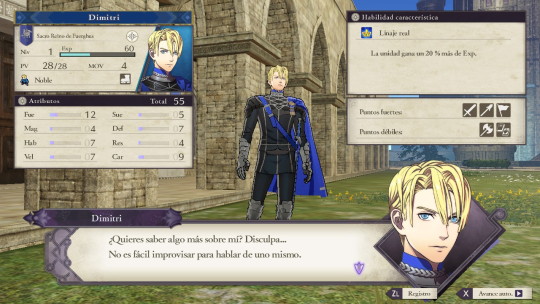
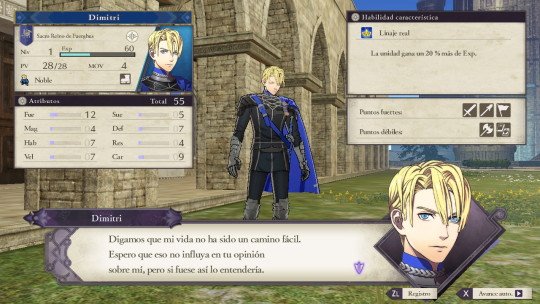
“You want to know more about me? Forgive me... It isn’t easy to improvise to talk about oneself. [something like “it isn’t easy to talk about oneself without preparation”]
Let’s say that my life has not been an easy road. I hope that doesn’t influence your opinion of me, but it it does I would understand.”
Personal Ability [Habilidad característica which is like “characteristic ability” or “unique skill”] - “Royal Lineage” - The unit gains 20% more experience.
[fuese is more common in Spain nowadays but that’s imperfect subjunctive; “if it were so/thus, I would understand” is sort of how it sounds]
- - -
Dedue
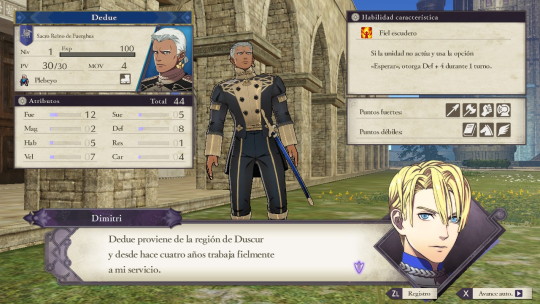
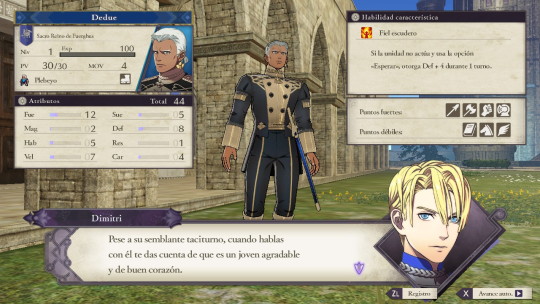
“Dedue comes from the Duscur region and has been working faithfully in my service for four years.
Despite his taciturn appearance, when you talk to him you’ll realize that he’s a pleasant and good-hearted young man.”
Personal Skill - “Loyal Squire” - If the unit does not act and uses the “Wait” option, grants Defense +4 for 1 turn.
- - -
Felix [I guess they’re treating it as a loanword but I did expect Félix with the accent mark]
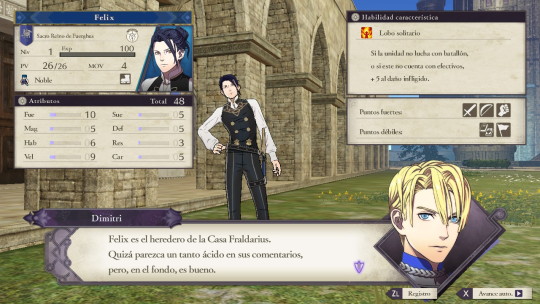
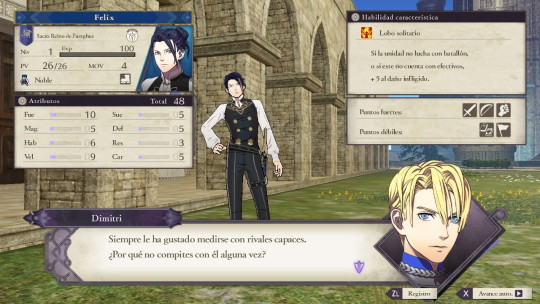
“Felix is the heir of House Fraldarius. He might seem somewhat caustic [lit. “acid/acidic”] with his words, but deep down, he’s kind.
He is always looking to go up against [lit. “measure himself against”] capable rivals. Why don’t you compete [probably “spar”] with him some time?”
Personal Ability - “Lone Wolf” - If the unit does not fight with a battalion, or if it [the battalion] does not have any troops, +5 to damage inflicted
- - -
Ashe
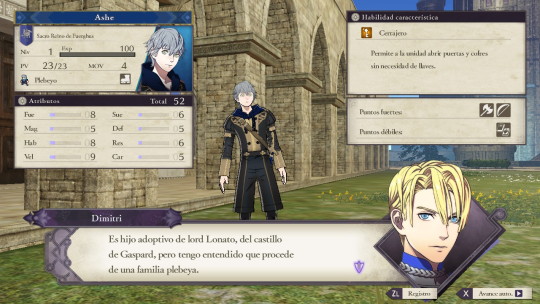
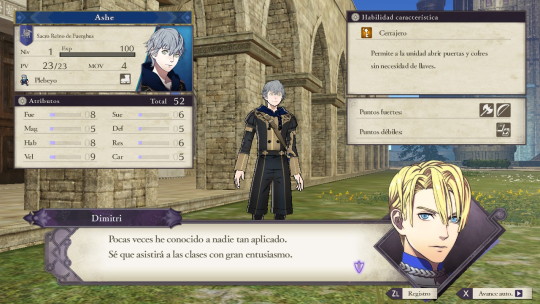
“He’s the adoptive son of Lord Lonato, from the castle Gaspard, but I understand [lit. “I have understood”, something like “I have come to understand” or “I have it on good authority”] that he comes from a commoner family.
Seldom have I met anyone as driven [lit. “applied” or “earnest”]. I know he will attend classes with great enthusiasm.”
Personal Skill - “Locksmith” - Allows the unit to open doors and chests without needing keys.
- - -
Sylvain
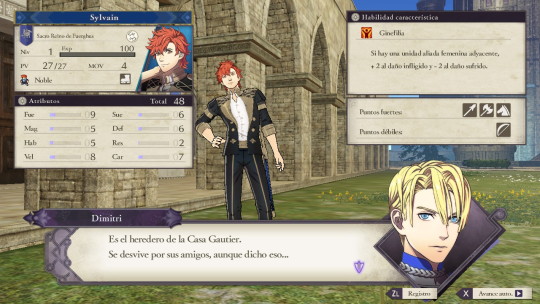
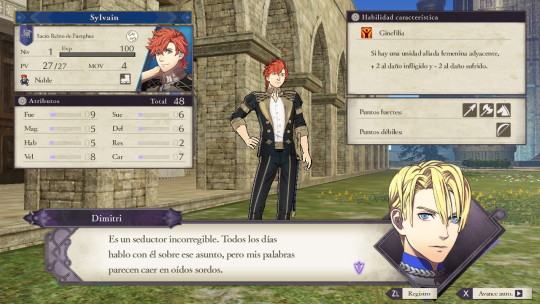
“He’s the heir of House Gautier. He goes out of his way for his friends, although that said...
He’s an incorrigible seducer. Every day I talk with him about the matter, but my words seem to fall on deaf ears.”
[The word in English Dimitri uses is “skirt-chaser” which would be something like persiguefaldas so not totally applicable. I understand why they didn’t go for calling him a Don Juan but still, “seducer” feels maybe not right?]
Personal Skill - “Gynephilia” - If there’s an allied female unit adjacent, +2 to damage inflicted and -2 to damage suffered.
[Probably the funniest translation; in English it’s “philanderer” which I would say is more like mujeriego “womanizer”. But ginefilia is literally “attraction to women”, so it just sounds like his skill is “I LOVE WOMEN”]
- - -
Mercedes
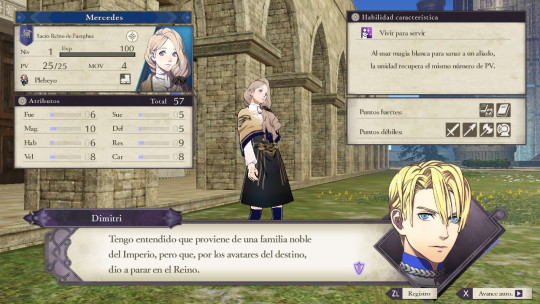
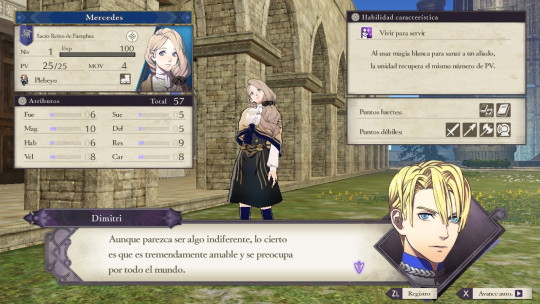
“I understand that she comes from a noble family in the Empire, but that, by the whims of fate, she came to rest [lit. “came to a stop”] in the Kingdom.
Although she may seem carefree, the truth is that she’s tremendously friendly and worries about everyone.”
[Maybe the most flowery translation so far, los avatares del destino is often like “the whims of fate” or “a series of coincidences”, but more literally it’s “the avatars of destiny” or “the arbiters of fate”.]
Personal Ability - “Live to serve” - Upon using white magic to heal an ally, the unit recovers the same number of HP.
[PV is HP; literally puntos de vida or “life points”]
- - -
Annette
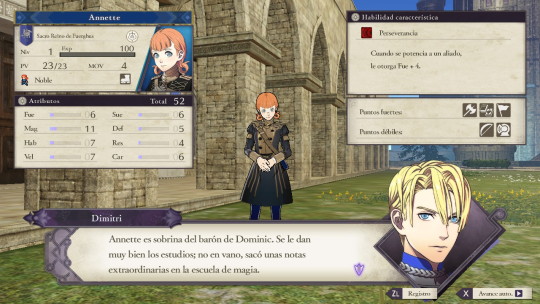
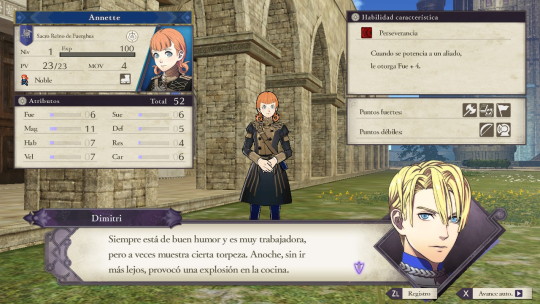
“Annette is the niece of the Baron of Dominic. She is very good at her studies [lit. “her studies suit her well”]; not for nothing, she earned extraordinary grades/marks in the school of magic.
She’s always in a good mood and is very hardworking, but sometimes she displays a certain awkwardness/clumsiness. Last night, without getting too much into it, she caused an explosion in the kitchen.”
[In English it’s “Royal School of Sorcery” which would be something like la Escuela/Academia Real de Hechicería... it sounds somehow more ordinary in Spanish like she was just at “magic school”]
Personal Ability - “Perseverance” - When powering up an ally, grants Strength +4.
[potenciarse is understood here as the translation for “rally”, but literally it’s “to grant power to”. Also Fue is understood as the abbreviation for Fuerza “strength”]
- - -
Ingrid
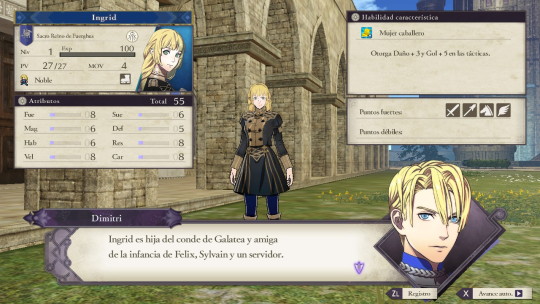
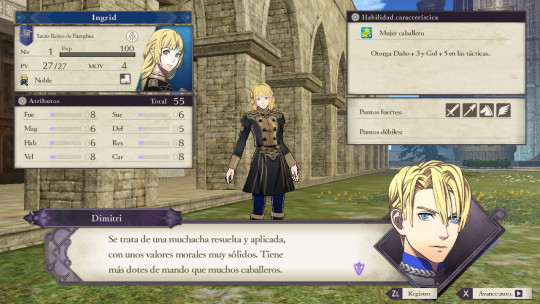
“Ingrid is the daughter of the Count of Galatea and childhood friend of Felix, Sylvain and myself.*
She is [lit. “she has to do with” or “she embodies”] a very resolute and earnest young woman, with very solid moral values. She has more leadership qualities than many knights.**”
**In English it’s “she’s more knightly than most knights” which I would personally have translated as ella es más caballeresca que la mayoría de los caballeros, or tiene más de caballero que la mayoría de los caballeros.
Personal Ability - “Lady Knight” - Grants Damage+3 and Hit+5 in gambits.
[lit. tácticas is “tactics” but it’s the translation of the term “gambits” in this game]
45 notes
·
View notes
Text
where do churches come from?
A schism, most simply, is a division. In church parlance, it refers to one group separating from another. Considered theologically, it is often framed in such a way that there is One Church, and a schism always entails some group separating itself from that Church. A schism can be driven by heresy--a difference of conviction--but it is always political.
When we talk about church history, certain schisms tend to stand out. In the fifth century, there were schisms that separated the Church of the East and the various non-Chalcedonian communions (Coptic, Armenian, etc.) from what we might loosely call the Catholic Church, or the Church of the Roman Empire. In the 11th century, there was the famous schism between what became known as the Roman Catholic and Eastern Orthodox Churches. And in the 16th century, there was the Protestant Reformation, which expressed itself in a series of schisms from the Catholic Church. Schism is often how separate "churches" form (I've already written about our problematic way of talking about such things), but it doesn't always go that far. A schism is a bit like an Ecumenical Council, in the sense that you don't necessarily know what kind you're dealing with until well after the fact. In this regard, it might help to consider two notable schisms currently ongoing within the Eastern Orthodox Church--one that probably won't amount to much, and one that could.
The first schism is between the Patriarchs of Antioch and Jerusalem. For several years now, they've been in a jurisdictional dispute about who has canonical authority over the Persian Gulf region. It involves a rather small number of faithful in a territory that has not had much Orthodox presence for many centuries. The Patriarchs don't commemorate each other and don't celebrate communion together, but that's about as far as it goes. It's meant as an expression that something is not right between them, and rather than brush their problems under the rug and act like everything's fine, they'll refrain from these symbols of unity until their issues can be resolved. But a layperson of the Antiochian jurisdiction can receive communion in Jerusalem, and even a priest or deacon can serve in the altar. I would guess that most of the faithful don't even know the schism exists. And this is probably typical of most schisms in their beginnings.
The second schism is between the Patriarchs of Constantinople and Moscow. It expresses a division that has been growing over decades, but it didn't formally start until 2018. Both claimed jurisdiction over the Orthodox Church in Ukraine but took different approaches to resolving its internal problems. The result was an establishment of parallel churches--one autonomous under Moscow, the other autocephalous (fully independent). Moscow views Ukraine as integral to the historic identity of the Russian Church, and its response was to withdraw from communion with Constantinople and pretty much anyone else who supported the autocephalous church structure it set up in Ukraine. And that goes all the way down to banning its priests, deacons, and laypeople from intercommunion, which is decidedly atypical. While there is no real issue of heresy per se, there are some pretty serious differences, and both sides seem quite entrenched. Given the organizational weakness of the Orthodox Church, I think it could evolve into a more permanent schism if left to run its course.
Now, what these two schisms have in common (at least for now) is that they are decidedly treated as schisms within the Orthodox Church. Even given the severity of the schism over Ukraine, no one else is participating. As far as I know, no other local Orthodox Church has broken communion with either side, and even Constantinople, for its part, has not broken communion with Moscow. So an Orthodox layperson under the Antiochian jurisdiction, for instance, can still receive communion in any other Orthodox church. Their clergy can concelebrate with Russian or Greek--just not both at the same time. So we would say definitively that the schism makes no theological difference--neither Constantinople nor Moscow has somehow left the One Church by virtue of being out of communion with the other.
Now, how does this relate to past schisms? What happened in 1054 was specifically a mutual excommunication of persons. Rome excommunicated the Patriarch of Constantinople, who in turn excommunicated the papal legates--significant actions to be sure, but probably not readily obvious as the start of some permanent reconfiguration. It was likely another 150 years before the laity were specifically forbidden from receiving communion across the aisle, so to speak, and that only in the wake of the Fourth Crusade, when the Latins seized Constantinople itself and set up their own churches in parallel with those of the East. Whatever differences of faith and practice may have existed before and after 1054, it was fundamentally the political climate that determined where one could receive the grace of the Church, not any clear spiritual boundary line.
We can talk in various ways about someone as being either Catholic or Orthodox, so long as we recognize what we're really saying. If the Orthodox Church is understood historically as the church of the Byzantine Empire, then a person born, raised, and living in Constantinople in the 12th century was probably Orthodox. But what if he moved to Rome? Would that suddenly make him Catholic? What would have to happen to change his identity? And is this just a historical question? Would our Byzantine abroad even have thought about it as a spiritual distinction?
Or what about a Latin soldier who came east with the Fourth Crusade, took part in the attack on Constantinople when he thought it was just to restore the rightful heir to the throne, but later sympathized with the Byzantines and chose to attend one of their churches? Was there a process for him to "convert"? Would such a thing even have occurred to anyone? Would it have been possible at that point in history?
Or what about today? If I was born and raised Protestant but "converted" as an adult to the Orthodox Church, what is my relationship to Rome? Am I supposed to have been Catholic all along? Am I somehow Western by birth but Eastern by choice? If I chose to become Catholic, I would be accepted by a simple profession of faith because I'm Orthodox. Would I then be Melkite Catholic so as to preserve my Eastern heritage? I'm an American convert from an American convert parish--what is the real significance of my Arab patrimony?
And speaking of which, what about the 18th century schism among the Arab Melkite Christians? Those who accepted Western support against Ottoman oppression became Catholic, while those who aligned with the Greek establishment in Constantinople were called Orthodox. Three centuries later, where is the substantive difference in their faith or practice? That one is theoretically in communion with all other Catholics and the other with all other Orthodox? That family allegiance marks them as one or the other? Where does this distinction put them with regard to the One Church?
So if we come at the question historically, I think it becomes difficult to rigidly identify the One (Holy, Catholic, Apostolic) Church with a specific institution. Divisions arise for many different reasons, and their interpretation depends on many different factors. Yes, everyone generally agrees right now to talk about Russian, Greek, Romanian, and Serbian Orthodox as all part of one Eastern Orthodox Church, and Roman, Ukrainian, and Melkite Catholic as all part of one Catholic Church. But the alignments and disputes over the centuries that have contributed to this picture seem to require only small nudges one way or another to have produced different results. Assigning theological weight to such historical details seems contrived.
And what makes matters worse is the force of inertia that seems to resist most efforts at reconciliation. After 15 centuries of separation, quite a few theologians have concluded that the doctrinal bases for schism between Chalcedonian and non-Chalcedonian Orthodox were minimal or non-existent. Political motivations have shifted to the point that it's probably in their interest to restore communion, but that's a lot of historical identity to overcome. On the other end of things, the two sides in the comparatively recent Melkite schism have almost everything in common and seem quite open to some sort of restoration; but relations with the broader Catholic and Orthodox Churches make it difficult to progress on the local level. And however promising overtures toward Catholic and Orthodox reconciliation might seem, it's difficult to envision a scenario that wouldn't split each Orthodox church down the middle and just exacerbate the divisions. Such reticence is understandable, I suppose, and only human--but as a basis for theological claims about where the One Church might reside, it seems pretty flimsy.
So all of this has me taking my identity as Eastern Orthodox much less seriously than I used to. Not that I feel inclined to give it up--I just don't know where the boundaries are, or even if I care. I've always known that these terms we use--One, Holy, Catholic, Apostolic, even Orthodox--are generically applicable to the claims of other apostolic churches (Catholic, Coptic, Armenian, etc.); but the reality seems similarly messy. We can't reduce it to One Church, excluding all else, or to various churches as branches of a whole. For me, it helps to think in terms of schisms, as they evolve through different historical moments and perceptions and prejudices and identities. If these divisions depended on human choices and actions in their formation, who's to say we couldn't end them just by changing our minds?
2 notes
·
View notes
Note
28, 24, 19, 9
In response to: Tumblr History Ask Meme: https://lady-plantagenet.tumblr.com/post/643743359209472000/ive-seen-plenty-of-tumblr-ask-challenges-but
24. Who do you consider to be one of the most underrated historical figures?
Ok. I won’t say Vlad the Impaler because he’s not strictly speaking underrated as much as he is misunderstood. I think a lot of you expect me to say George of Clarence but as much as I believe he should be studied far more than he is - maybe not much for himself (from an academic point of view I say this) as for a case study on the instability of the late medieval faith in the sanctity of the crown, the bastard feudalism phenomenon, private justice and maybe how a posterity can develop strangely throughout the centuries with little historicity. But his short life and the fact that he is stronger in his impact on history via his failure than his deeds I would say Richard Neville 16th Earl of Warwick is truly history’s most underrated figure. I have yet to read a biography of him but the fact of the matter is that his presence in the tale of the development of British history, society and constitution seems strong enough to merit a mention of him in Adam Smith’s Wealth of Nations and even among most of the works of Whig and Enlightenment historians who centuries later feel threatened by the type of person he represented to them (‘anti-progress’, ‘an impediment to the development of democracy’). Clarence is always a question of what could have been whereas Warwick lived long enough to live a truly studeable life. There was no one like him before in English Medieval history and there would be no one like him - I’ve seen strange takes on him by his biographers ‘populist’, ‘self-publicist’, ‘visionary’ and of course ‘legend’ (and indeed as it seems of a presence made known to all people). I have yet to check if these claims have any logic behind them but from what I can see they very well could. He indeed personified an era in itself and yet he’s hardly a household name nowadays??
28. Do you have a favourite “dream team” of historical figures living at the same time in a specific era of history?
The three dudes I mentioned above DEFINITELY. They could have all met had Edward IV also answered Pius II’s call to crusade. Of course, I’d rather there not be a crusade... because well... no one wants that. Vlad the Impaler was at the other side of the continent and tbh circumstances would need to probably involve the Holy Roman Empire for the three parties to ever intersect in any way. Warwick and Vlad were at opposite ends where policy was concerned... Vlad culled the boyars who he deemed corrupt at the gathering of the Tîrgoviste court and Warwick (and Clarence) was basically their English counterpart. Although, Vlad believed his nobles to have sold out the country to the Ottomans and been responsible for his father and brother’s death so there’s that going. All three did care for their country though so I guess they can unite under that and had reputations for embodying late medieval chivalry. Of course the caveat is that while Warwick (and Clarence at one point) was popular with the nobles, Vlad was deeply hated by them. But yeah I still cannot genuinely believe they were all alive at the same time like that’s actually insane. Of course, throw in Louis XI of France (another very interesting monarch) but technically speaking he and Warwick were a dream team XD.
19. What’s your favourite historical book?
Ive answered this before here :)x . I would otherwise switch to favourite fiction book but I’ve also spoken about that on here XD. And I’ll not talk about another because one can only have one favourite ey? I’ll link them here:
9. Favourite historical film?
Hmm... It’s a toss-up between Man for All Seasons and Lion in Winter. The former is about Thomas More and is extremely smart about how it handles the real cause of his downfall and the dialogue is utterly superb together with the acting. It also gets the aesthetics very down to a t and is one of those pieces that doesn’t attempt to simplify everything by making a hero or a villain out of anyone and that’s what it makes it a true tragedy. I also feel that the playwright truly understood how Catholicism= ignorance is not ok (a trope I rly hate). I also appreciate how Thomas More is shown as someone dedicated to his ideals not team Catherine, Anne or whatever; the aforementioneds are actually insignificant to the whole thing, which while might not be very accurate is refreshing.
The latter is an fictionalised Angevin drama set at the fictional Christmas court of Chignon with the whole Angevin crew: Henry, Eleanor, the three remaining sons and of course Philippe of France ready to throw a wrench. For a comedy it is extraordinary smart and I feel like it also has this vague self-awareness to it which has really survived the test of time (like the ‘it’s 1183 and we all still carry knives’ line hhh). Yet somehow it had its heartfelt moments eg Richard I and Eleanor of Aquitaine’s exchange in the gardens. Geoffrey of Brittany is also a trip to watch (who can forget the ‘I know, you know, you know I know, I know you know I know you know’ line?). Also it was great to see Peter O’Toole reprise his role as Henry II from Becket. I must say I much prefer him here. Despite being a comedy, the aesthetics and musical soundtrack never fail to draw in the necessary splendour and emotion and the acting is sensational.
#🍷❤️#I did say I would answer something today!#btw I’ll post fancy underline links tommorow when I get back onto my laptop#I appreciate it looks a bit trash#vlad the impaler#richard neville 16th earl of warwick#richard neville earl of warwick#lord warwick#warwick the kingmaker#george of clarence#george duke of clarence#george plantagenet
3 notes
·
View notes
Text
I kinda just wanna word vomit my jumbled thoughts on the still [technically] unsolved HRE-Germany situation because I'm bored and have no Hetalia friends. Also I want to stop thinking about it.
I believe I first saw it on a reddit post at least 2 months ago but it is more sensible to think that Germany is instead a descendent of some kind of the HRE's rather than the HRE himself. Which makes Germany Germania's grandson I guess? I dont know whatever. Although HRE was at least 10 yrs to a preteen by then(by the looks of it in the strips anyway) so I suppose that can be ruled out unless there's more evidence supporting it. Historically speaking, yes The Holy Roman Empire and Germany are one in the same. It was even semi formally called "The Holy Roman Empire of the German Nation." A lot of evidence does point to the HRE and Germany being the same Hetalia character, yes, but what I'm wondering is why does Germany not remember? Prussia has to remember his days as the Teutonic Order. He was basically upgraded from the German Order to the Kingdom of Prussia. A simple name change. Name changes occur a lot to developing or established countries over time but I don't think those name changes just erase a [Hetalia] personification's memories. Or could there of been a new personification formed? It would explain Germany's lack of memories. France defeated the HRE. We know this. But Germany doesnt remember. It just doesn't make sense to me that the HRE and Germany are exactly the same characters. Could it be reincarnation? As in Germany once was the HRE in a past life but he, his soul or what have you, was reborn as who he is now— I mean it wouldn't be such a farfetched idea. Reincarnation was already touched upon in the series. I'm not sure what to personally believe, aside from the irl historical facts. What I wanna know is if Germany and the HRE are the exact same person or if Germany is just the HRE reborn into a new conscious personification. Everything is confusing, especially when you think about how Germany was a established region since about 800-900 AD. You could chalk that up to Germania being the physical manifestation at that time. Or not. Again its actually confusing thinking about HOW APH nations work. They have DNA, as evident by the test Norway had done to see if he and Iceland are blood related.
And quick realization I made while chucking this up: Veneziano probably doesn't see Germany as scary because his appearance vaguely looks like someone(the HRE) he once found comfort and trust in, especially in his childhood which could be Veneziano's best memories(since Rome was present as well as the HRE; his grandfather and first, possibly last, real love).
#hetalia#hetalia ramble#hetalia theory#hetalia germany#hetalia germania#hetalia veneziano#hetalia prussia#long post
16 notes
·
View notes